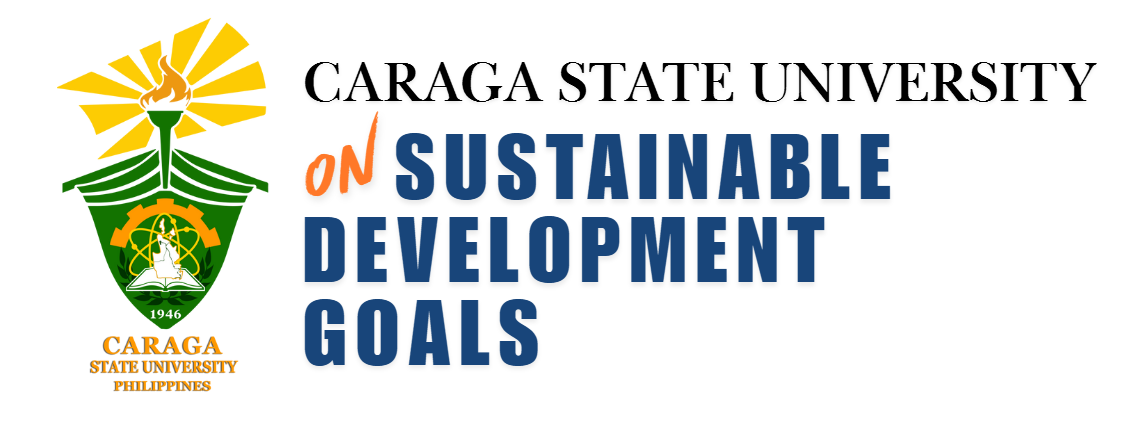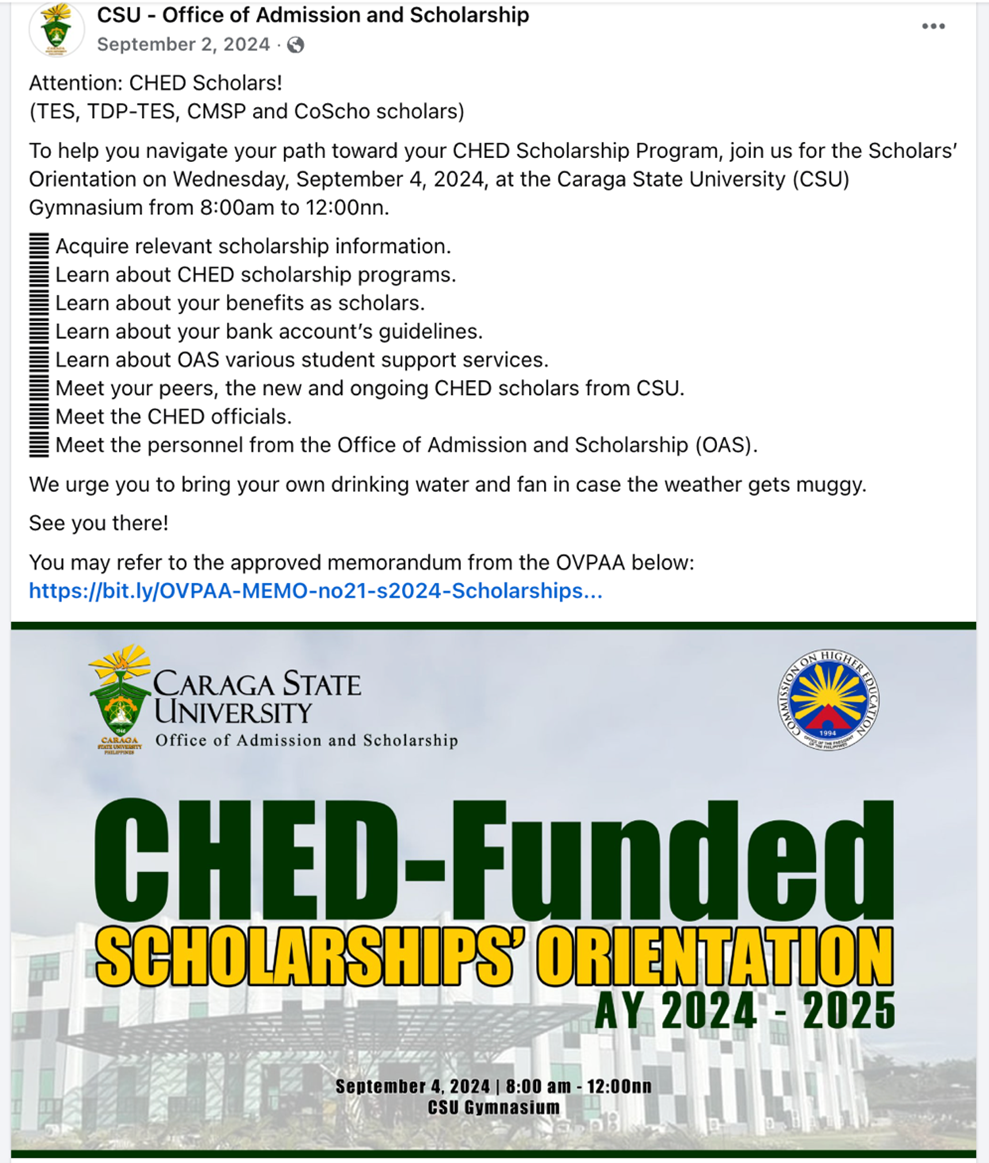Sustainable Development Goal (SDG) 1: CSU on No Poverty
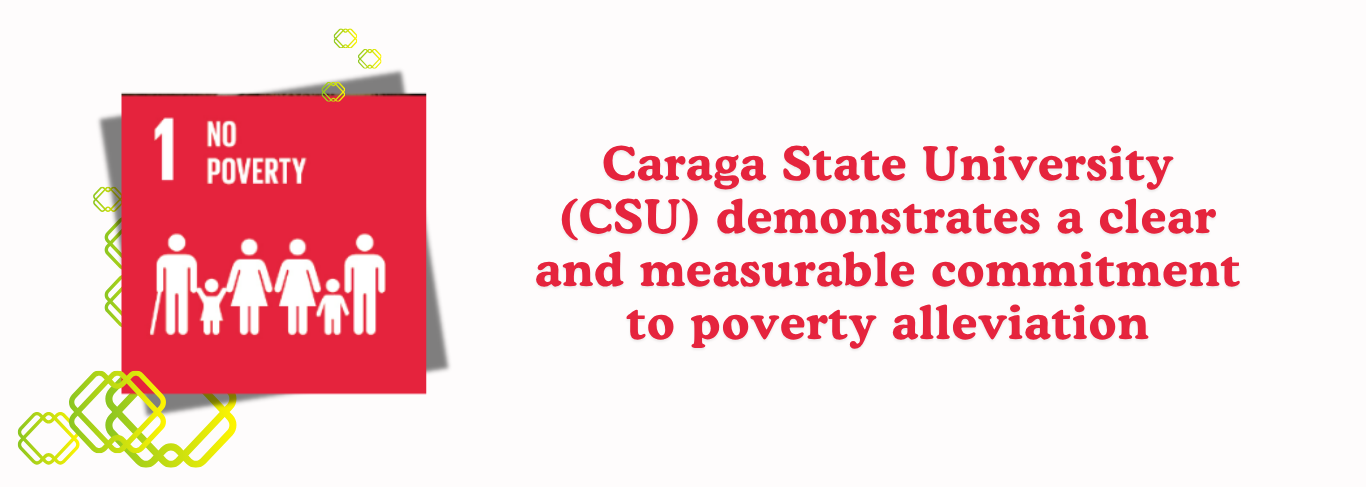
Background
Overview of the University’s Commitment to SDG 1: No Poverty
Caraga State University (CSU) demonstrates a clear and measurable commitment to poverty alleviation. The University’s approach holistically integrates research, student financial support, institutional anti-poverty initiatives, and community engagement programs, ensuring that CSU contributes meaningfully to ending poverty in all its forms.
CSU continues to advance its mandate of poverty reduction through research-driven, innovation-centered, and community-responsive initiatives. Grounded in its mission to uplift socio-economic conditions in Caraga and beyond, the university strategically mobilizes its academic expertise, research capabilities, and extension networks to deliver sustainable poverty alleviation outcomes.
This goal is integral to CSU’s mission of fostering inclusive growth and uplifting disadvantaged communities. Through strategic initiatives, impactful research, and active community engagement, CSU aims to create sustainable pathways out of poverty and promote social equity. Our policies and programs in Caraga State University reflect a holistic approach, encompassing education, economic empowerment, and partnerships that address the root causes of poverty. By aligning our strategic objectives with SDG 1, we strive to make a meaningful difference in the lives of individuals both locally and globally.
Research, Development, Innovation, and Extension (RDIE) Contributions
CSU has actively pursued targeted initiatives and community development programs aimed at enhancing livelihood opportunities and fostering economic self-reliance among local populations. By strategically leveraging its academic and research capabilities, CSU has introduced evidence-based solutions that directly contribute to poverty alleviation.
Central to CSU’s approach is its commitment to conducting comprehensive, data-driven research that informs policy and program development. These research efforts are designed to identify the most effective methods for boosting economic activities, improving access to resources, and empowering communities through informed decision-making. By aligning research with real-world applications, CSU bridges the gap between academic inquiry and practical, impactful solutions.
CSU’s documented contributions include four significant research-driven projects that lay a strong foundation for future poverty reduction initiatives. These projects have focused on areas such as sustainable agriculture, microenterprise development, and technology-based education, providing scalable models that address the unique challenges of the region. Collaborative partnerships with local government units, non-governmental organizations, and industry stakeholders have amplified the reach and effectiveness of these research initiatives.
The university’s dedication to Goal 1 extends beyond short-term outcomes; it emphasizes a long-term vision rooted in continuous research and innovation. By fostering interdisciplinary collaboration and strategically investing in research-driven solutions, CSU aims to create sustainable economic frameworks that empower communities and contribute to regional and national objectives of poverty eradication. Through ongoing research efforts, CSU remains committed to making a meaningful and measurable impact on poverty reduction and inclusive growth.
Key Initiatives, Projects and Programs and Activities for SDG 1 No Poverty (2024)
CSU has several initiatives and achievements that align with Sustainable Development Goal 1 (No Poverty) by focusing on improving socioeconomic conditions, particularly for marginalized communities. Notable examples include:
1. Large-Scale Livelihood and Skills Development Trainings
Caraga State University’s 2024 Extension Program demonstrates a strong alignment with SDG 1: No Poverty through its extensive livelihood and skills development initiatives aimed at improving employability and enhancing the economic resilience of disadvantaged communities. The program recorded 12,116.25 trainees, surpassing its original target by an impressive 99%, reflecting the high demand for capability-building interventions and the university’s expanding reach across the region. These trainings constitute a comprehensive suite of livelihood-focused activities designed to equip community members—particularly those in low-income and rural barangays—with practical, marketable skills that can generate immediate economic returns. Among the core training programs implemented were Baking Livelihood Skills, Welding and Fabrication Technology, Silk Screen Printing, and Light Vehicle Driving with Engine Tune-Up and Preventive Maintenance, each offering participants direct pathways to self-employment or wage-based work.
Beyond technical trades, the program also strengthened agricultural livelihoods by delivering specialized training on Coffee Farming Technologies, Irrigated Lowland Rice Production, and Abaca Production and Disease Management, thereby supporting farmers in increasing productivity, reducing losses, and accessing better market opportunities. Collectively, these interventions help address the structural roots of poverty by widening access to economic resources, diversifying income sources, and empowering households to build more stable and sustainable livelihoods. Through large-scale community engagement and responsive program design, CSU’s extension efforts significantly contribute to reducing economic vulnerability and improving the overall well-being of the communities it serves.
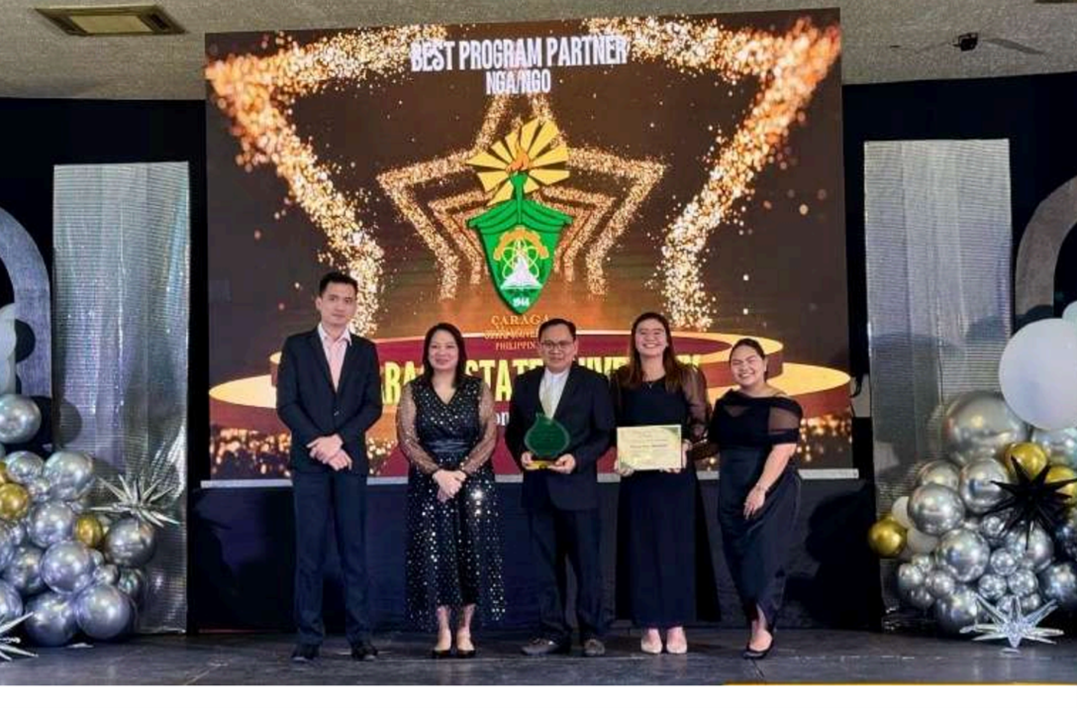
The Caraga State University was recognized as the Best Program Partner-NGA/NGO for commendable support and exemplar contribution to Sustainable Livelihood Program for CY 2024 and received trophy of Kabalikat Award under Public Partner Category as Most Outstanding Partner. This given on 13th day of December 2024 at Doties Place, Butuan City. The event was attended by our Extension Director Dr. Romell A. Seronay together with TTLO/ITSO Chief Charisse D. Galusan.
(See pages 5, 11, 21, 24, 44, 47, 92, 96 of the 2024 RDIE Report, please see link: 2024 RDIE Annual Report)
Document link: 2024 RDIE Annual Report
2. Extension Programs Supporting Agriculture & Rural Livelihoods
CSU’s 2024 extension initiatives significantly strengthened agricultural productivity and rural livelihoods, directly contributing to poverty reduction in farming communities across Caraga.
These programs target poor farming communities, improve productivity, reduce losses, and stabilize income sources. Key agricultural extension efforts:
- Vegetable Seedling Production Training (Pages 5, 92, 96 of the 2024 RDIE Report, please see link: 2024 RDIE Annual Report)
- Ruminant Feeding Programs (Pages 5, and 92 of the 2024 RDIE Report, please see link: 2024 RDIE Annual Report)
- Coffee Farming Technologies Pages 92 of the 2024 RDIE Report, please see link: 2024 RDIE Annual Report)
- Abaca Disease Management (Pages 5, 91, and 92 of the 2024 RDIE Report, please see link: 2024 RDIE Annual Report)
- Rice Production and Management Training (Page 92 of the 2024 RDIE Report, please see link: 2024 RDIE Annual Report)
Through a series of targeted agricultural extension programs, CSU addressed long-standing constraints faced by smallholder farmers—such as low productivity, vulnerability to crop diseases, and limited access to modern farming knowledge—thereby helping stabilize income sources and reduce economic risks.
Among the key interventions was the Vegetable Seedling Production Training, which equipped farmers with practical skills in raising high-quality seedlings, enabling them to improve crop yield and diversify income-generating opportunities. Complementing this were Ruminant Feeding Programs designed to enhance livestock health and productivity, ultimately supporting local farmers who rely on cattle, goats, and other livestock as essential livelihood assets.
 CSU also advanced farmers’ economic capacity by delivering specialized trainings on Coffee Farming Technologies, providing updated techniques on coffee cultivation, sustainability practices, and value chain participation—critical for communities engaged in the expanding regional coffee industry. Likewise, the university addressed major agricultural threats through its Abaca Production and Disease Management training, which focused on mitigating virus diseases that have historically reduced abaca yield and negatively affected farmer incomes. To further strengthen rice-producing communities, CSU implemented comprehensive Training on Irrigated Lowland Rice Production and Management, promoting improved farming practices, proper field management, and the adoption of science-based techniques that increase harvest output and reduce post-harvest losses.
CSU also advanced farmers’ economic capacity by delivering specialized trainings on Coffee Farming Technologies, providing updated techniques on coffee cultivation, sustainability practices, and value chain participation—critical for communities engaged in the expanding regional coffee industry. Likewise, the university addressed major agricultural threats through its Abaca Production and Disease Management training, which focused on mitigating virus diseases that have historically reduced abaca yield and negatively affected farmer incomes. To further strengthen rice-producing communities, CSU implemented comprehensive Training on Irrigated Lowland Rice Production and Management, promoting improved farming practices, proper field management, and the adoption of science-based techniques that increase harvest output and reduce post-harvest losses.




Collectively, these agricultural community extension programs contribute to building more resilient, productive, and sustainable rural economies. By equipping farmers with the knowledge and tools needed to enhance yield, manage risks, and diversify income streams, CSU plays a pivotal role in reducing poverty, improving food security, and supporting long-term economic stability among the region’s most vulnerable communities.
Document link: 2024 RDIE Annual Report
3. Technology Transfer Projects Improving Income and Productivity
Caraga State University’s technology transfer initiatives in 2024 provide powerful contributions to SDG 1: No Poverty by directly enhancing the productivity, income-generating capacity, and operational efficiency of poor farmers, fisherfolk, local enterprises, and LGUs.
These technologies benefit poor farmers, fisherfolk, LGUs, and small industries. Examples of utilized technologies:
- Sago Processing Technology (reduces labor, increases yield)
- Copra Dryer (improves quality → higher market value)
- Snail Collecting Device for rice farmers
- Kaong Meat Extractor
- Tablea Molder (for cacao-processing MSMEs)
- Solar Electrification for off-grid barangays
- Agricultural & Fisheries Mapping (GeoAgri) Coconut Product Development These technologies provide direct economic upliftment and support local enterprises.

The university successfully deployed a range of community-responsive technologies designed to address long-standing barriers to economic mobility in rural and marginalized areas. Among these innovations is the Sago Processing Technology, which significantly reduces manual labor and increases production yield, enabling sago-producing communities to scale up output and improve their earning potential. Similarly, the Copra Dryer enhances the quality and uniformity of processed copra, allowing coconut farmers to secure better market prices and reduce post-harvest losses—an important step for households dependent on copra as a primary income source.
Other technologies such as the Snail Collecting Device for rice farmers and the Kaong Meat Extractor offer labor-saving alternatives that improve efficiency and reduce production time, supporting the livelihood efforts of small-scale agricultural producers. Meanwhile, value-adding equipment such as the Tablea Molder benefits cacao-processing MSMEs by standardizing product quality and expanding market potential. The university’s provision of Solar Electrification Systems for off-grid barangays not only improves living conditions but also reduces energy costs and expands opportunities for entrepreneurship in remote communities. In partnership with LGUs, CSU also deployed Agricultural and Fisheries Mapping (GeoAgri) technologies, which enable data-driven planning and help local farmers and fishers optimize resource use and increase productivity. Additionally, innovations in Coconut Product Development strengthen microenterprises by diversifying product offerings and elevating local industries.
Collectively, these technology transfer efforts deliver tangible economic upliftment by strengthening local value chains, reducing labor burdens, promoting efficiency, and creating livelihood opportunities. CSU’s commitment to community-centered innovation ensures that technology becomes a practical tool for poverty reduction, enabling rural and disadvantaged populations to build more sustainable and resilient sources of income.
See pages 8, 9, 17, 18, 19, 96 of the 2024 RDIE Report, please see link: 2024 RDIE Annual Report)
4. Utilized Technologies that Improve Economic Conditions of Communities
Caraga State University’s deployment of utilized technologies in 2024 demonstrates a clear and measurable contribution to SDG 1: No Poverty, as these research-based innovations were successfully transferred to local government units (LGUs), small industries, and community enterprises to improve productivity, efficiency, and income generation. The university’s Sago Processing Technology, for instance, directly addresses labor-intensive production practices by automating critical steps, allowing local processors to increase output and improve product quality—thereby raising their earning potential. Likewise, the Copra Dryer enhances the quality and consistency of copra, enabling coconut farmers to command higher market prices and minimize losses caused by traditional sun-drying methods. CSU also introduced practical tools such as the Snail Collecting Device, which supports rice farmers in mitigating pest-related crop damage while reducing labor time, ultimately protecting yields and stabilizing incomes. In partnership with LGUs, the university deployed innovations like the Tax Mapping System, which improves local revenue generation, strengthens public financial management, and indirectly supports poverty reduction by enabling LGUs to fund essential community services.
An expanded list of utilized technologies—including food processing equipment, agricultural tools, and digital mapping systems—demonstrates the university’s wide-reaching efforts to empower rural communities and microenterprises. These deployments exemplify strong SDG 1 outcomes, as each technology transfer initiative creates tangible economic benefits, enhances local enterprise capacity, and provides communities with sustainable means of improving their livelihoods. CSU’s commitment to transforming research outputs into practical, community-ready technologies ensures that innovation becomes an accessible pathway for economic upliftment, especially among poor and marginalized sectors.
See pages 7, 8, 17, 52, 96 of the 2024 RDIE Report, please see link: 2024 RDIE Annual Report
5. Partnerships that Enable Poverty-Alleviation Programs
Caraga State University’s strong network of 36 active partnerships with local government units (LGUs), businesses, non-government organizations (NGOs), national agencies, and community groups plays a vital role in enabling and expanding the university’s poverty-alleviation programs. These collaborations ensure that livelihood trainings, agricultural support initiatives, and technology transfer projects reach the poorest and most marginalized communities. By working closely with LGUs, CSU is able to align its interventions with local development priorities, enhance resource mobilization, and provide targeted support to farming households, microenterprises, and rural sectors that need it most. Partnerships with industries and SMEs strengthen market linkages and open economic opportunities, while collaborations with NGOs and people’s organizations help deliver community-driven programs that enhance local resilience and income generation.
In addition to local collaborations, CSU’s international partnerships significantly contribute to capability-building initiatives that uplift disadvantaged communities. These global linkages bring in technical expertise, research funding, training opportunities, and access to best practices that help elevate the quality of CSU’s extension and development programs. Such partnerships enhance the university’s ability to implement inclusive development initiatives—from agricultural innovation to community entrepreneurship—ensuring that poor communities benefit from globally informed, locally responsive solutions. Collectively, these partnerships amplify CSU’s impact on poverty reduction by fostering shared responsibility, pooling resources, and empowering communities through knowledge, technology, and collaborative action.
In Summary:
Caraga State University’s 2024 accomplishments reflect a robust and intentional contribution to SDG 1: No Poverty, grounded in a diverse set of programs and initiatives that uplift vulnerable sectors and strengthen local economic resilience. Central to its efforts is an expansive livelihood and skills development program that reached more than 12,000 beneficiaries, equipping individuals from low-income and rural communities with practical competencies for employment and enterprise development. Complementing this is the university’s strong emphasis on technology transfer, where community-ready innovations—such as processing equipment, agricultural tools, and digital systems—were deployed to cooperatives, LGUs, and microenterprises to enhance productivity and generate sustainable income sources.
CSU also prioritized agricultural capacity-building, delivering science-based training on crop production, livestock management, and disease control to smallholder farmers who continue to face systemic barriers related to poverty, limited market access, and environmental risks. These efforts were further amplified through CSU’s support for MSMEs and community enterprises, enabling local producers to add value to their products, improve efficiency, and access broader market opportunities. Research initiatives addressing the persistent poverty experienced by smallholder farmers—particularly those in the tree farming and agroforestry sectors—demonstrate the university’s commitment to evidence-based policymaking and community empowerment.
To ensure that no sector is left behind, CSU implemented programs specifically targeting GIDAs and marginalized populations, including indigenous communities, low-income rural households, and underserved barangays. These interventions expand access to essential services, capacity-building, and livelihood support for groups that face heightened vulnerability to economic shocks. All these efforts are made possible through the university’s strong multi-sectoral partnerships, engaging LGUs, non-government organizations, industries, community groups, and international collaborators. These partnerships create a unified platform for resource sharing, program implementation, and sustainable poverty-reduction strategies, positioning CSU as a key driver of inclusive development in the Caraga Region.
CSU SDG 1.1 Research Performance and Accomplishments
Caraga State University demonstrates a strong and steadily improving position in SDG 1 (No Poverty) research, contributing impactful knowledge outputs, community-driven technologies, and high-quality publications aligned with poverty alleviation. Guided by the CSU OVPRDIE’s mandate to advance research and innovation for inclusive socio-economic development, CSU has exceeded key performance indicators that map directly to THE Impact Ranking metrics for SDG 1.
CSU continues to strengthen collaborative research relationships across developing economies. With 27 active international partnerships and intensified faculty mobility programs, the university has positioned itself as a regional hub of collaborative research addressing poverty, agriculture, education, and community resilience. These linkages—especially those with Southeast Asian, South Asian, and African institutions—support CSU’s alignment with LMIC co-authorship requirements mandated by THE.
CSU’s research maintains a highly competitive global citation performance. The university achieved a 98.63% citation rate for SCOPUS- and Web of Science–indexed articles over the last three years, with 288 out of 292 indexed publications cited at least once. This strong citation footprint elevates the field-weighted impact of CSU’s SDG 1-related research, particularly in poverty studies, sustainable agriculture, livelihood technologies, food systems, and rural development—areas highly correlated with the SDG 1 thematic landscape.
CSU shows exceptional productivity. In 2024 alone, the university completed 182 Scopus research outputs, surpassing its institutional target. Many of these publications directly address poverty and rural livelihood issues, including research on food innovation, sago processing, abaca virus disease management, coconut product development, climate-resilient agriculture, and community socioeconomic upliftment projects. Furthermore, CSU recorded 131 published papers in international refereed journals, representing 74.85% of its target and demonstrating strong research dissemination and global visibility.
What distinguishes CSU in the SDG 1 research dimension is its unique integration of research-to-extension outputs that provide tangible economic benefits to poor and rural communities. Technologies such as the Sago Processing Technology, Copra Dryer, Snail Collecting Device, Coconut Product Development innovations, Mine Safety Virtual Reality System, and Real Property Tax Mapping System have been formally transferred or utilized by LGUs, cooperatives, and small industries, generating livelihood opportunities and enabling higher income for farmers and fisherfolk. A total of 16 research outputs were documented as utilized by stakeholders, confirming a high level of real-world impact.
The selected research outputs collectively highlight Caraga State University’s strong contribution to SDG 1: No Poverty through innovations that directly enhance livelihoods, productivity, and access to essential services in low-income and rural communities. These works span a wide range of poverty-targeted solutions, including value-adding technologies for local commodities such as cacao, banana, sweet potato, abaca, and aquaculture products; agricultural and postharvest innovations that reduce losses and increase income; and affordable IoT-based systems for climate control, energy generation, and environmental management that support community enterprises and small-scale producers. Several studies address inclusive technologies for vulnerable groups, including low-cost medical devices and assistive mobility solutions, while others develop digital marketplaces, livelihood-enabling tools, and community-based resource assessments that strengthen local economic participation. Altogether, the papers demonstrate an integrated research agenda that empowers farmers, fisherfolk, micro-entrepreneurs, and marginalized populations by improving productivity, reducing economic vulnerabilities, and expanding access to income-enhancing technologies—solidifying CSU’s measurable impact on poverty alleviation in the region.
The following is the list of research papers published in 2024 as Scopus-indexed that we consider contributing to SDG 1:
- From Waste to Wealth: Entrepreneurial Ventures in Chitosan Extraction for Environmental Sustainability
- Socially inclusive valorization of gold mill tailings from the small-scale gold mining sector
- Design and Enhancement of Pico Hydro and Monitoring System for Generation of Electricity
- Design, Fabrication, and Performance Evaluation of a Small-Scale Integrated Saba Banana Flour Mill
- An Egg Incubator with IoT-Based Control and Monitoring System
- Synergistic Paradigms: Developing R&D and Extension Framework for Sustainable Agrifood Systems
- Impact Assessment of the Government-installed Solar-Powered Irrigation Systems in Agusan del Sur
- Design, Fabrication and Performance Evaluation of Sweet Potato (Ipomoea batatas L.) Flour Mill for Small-Scale Applications
- Design and Development of a Web-based Marketplace for Aquatic Products in the Municipality of Magallanes, Agusan del Norte
- Design and Development of a Smart Blind Stick for Enhanced Mobility and Independence of Visually Impaired Individuals
- Evaluation of Guso (Kappaphycus alvarezii) Seaweeds as Edible Coating to Eggplant (Solanum melongena var. Calixto) stored under Ambient Conditions
- Effects of Chitosan and Pomelo (Citrus maxima var. Magallanes) Peel Extract on the Postharvest Quality and Shelf Life of Bitter Gourd (Momordica charantia I. var. Galaxy Max F1) under Ambient Condition
- Determining the Correlation between Abaca (Musa textilis) Distribution Patterns and Bunchy Top Disease Prevalence in the Caraga Region through Spatial Point Pattern and Statistical Analysis
- Combining Land Suitability Models in Determining the Optimal Locations for Establishing Abaca Plantations (Musa testilis) in Caraga Region, Philippines
- Using Maxent in Quantifying the Impacts of Climate Change in Land Suitability of Abaca (Musa testilis) in Caraga Region, Philippines
- Design and Development of a Hand-Operated Cacao Pod Splitting Device
- Development of a Cacao (Theobroma cacao L.) Bean Huller
- Design and Development of Combined Cacao Bean Dehuller-Pulverizer Machine for Cocoa Powder Processing
- Internet-of-Things (IoT) – Based Automated Temperature Monitoring and Control System for Enhanced Cacao Fermentation Quality
- A Novel Automated Steaming Machine for Mass Production of Aripahol
- IoT-based climate control system for the cultivation of oyster mushroom (Pleurotus ostreatus) fruiting bag
- Design and Development of Solar-Powered Smart Fish Tank for Hatchling Cultivation with IoT-Based Monitoring
- Design and Development of a Low-Cost Pi-Duino Ventilator: An Affordable Respiratory Support in Resource-Limited Settings
- Evaluating Healthcare Benefits of Senior Citizens through Opinion Mining
Collectively, these research contributions affirm CSU’s enduring commitment to uplifting the lives of vulnerable and low-income communities through science, technology, and innovation. By generating practical, scalable, and community-responsive solutions—ranging from livelihood-enhancing equipment to inclusive digital systems and low-cost technologies—these works translate academic knowledge into meaningful socio-economic impact. More importantly, they demonstrate how a university can become a catalyst for poverty reduction by empowering local producers, strengthening micro-enterprises, and improving access to essential services. These papers showcase CSU’s unique strength: research that is not only rigorous and relevant, but also deeply rooted in the needs, realities, and aspirations of the communities it serves.
In summary, CSU’s SDG 1 research performance reflects a strong and multidimensional commitment—demonstrating high-quality, highly cited publications, international LMIC collaborations, and research products that directly address economic vulnerabilities in rural communities. These accomplishments firmly position CSU as one of the leading SUCs in the Philippines in linking research excellence with sustainable poverty alleviation outcomes.
Proportion of students receiving financial aid to attend university because of poverty
The data from Caraga State University (CSU) regarding the number of enrolled students for the 2nd semester of AY 2023-2024, the midyear term, and the 1st semester of AY 2024-2025 provides an insightful overview of the university’s enrollment distribution across various colleges and programs.
1.2.1 Low-income students receiving financial aid
The total of students enrolled across all colleges and terms at Caraga State University reached 34,350 (combined for Cabadbaran and Main Campus) for the two semesters in 2nd Semester AY 2023-2024 (January 2024 to May 2024), midyear term (June to July 2024), and 1st Semester AY 2024-2025 (August 2024 – December 2024). This distribution underscores the university’s diverse academic offerings, with strong enrollments in both traditional fields like agriculture and forestry and emerging fields such as information technology and engineering.
Table 1: Summary of the enrollment data at Caraga State University (CSU) across various colleges and programs:
| College | Total Student Enrollment |
| Graduate School | 2716 |
| College of Agriculture and Agri-Industries (CAA) | 2219 |
| College of Computing and Information Sciences (CCIS) | 3642 |
| College of Education (CEd) | 3742 |
| College of Engineering and Geo-Sciences (CEGS) | 3492 |
| College of Forestry and Environmental Sciences (CoFES) | 3234 |
| College of Humanities and Social Sciences (CHaSS) | 3105 |
| College of Mathematics and Natural Sciences (CMNS) | 2776 |
| College of Business and Accountancy (CBA) | 2,888 |
| College of Engineering and Information Technology | 2004 |
| College of Industrial Technology and Teacher Education | 2,203 |
| College of Tourism and Hospitality Management | 2,329 |
Total number of students for two semesters: On the average of students per semester: | 34,350; 17,175 |
Number of low-income students receiving financial aid
Based on the Philippine Statistics Authority (PSA) data, we consider the poverty threshold for a family in the Philippines, and we identify students whose annual gross income falls below PHP 120,000 annually:
For the 2nd semester 2022-2023 (January 2024 to May 2024) there are 9,373 students at CSU with an annual gross family income below PHP 120,000, which can be considered under the low-income category according to typical poverty thresholds set by the Philippine Statistics Authority (PSA).
For the 1st semester 2023-2024 (August 2024 to December 2024), a total of 9,506 students fell under the low-income category with an annual gross family income below PHP 120,000.
| Semester | Low-Income Students | Enrollment (average per semester) | % Low-Income |
| 2nd Sem 2022–2023 | 9,373 | 17,175 | 54.56% |
| 1st Sem 2023–2024 | 9,506 | 17,175 | 55.33% |
| Overall (Two Semesters) | 18,879 | 34,350 | 54.96% |
The total number of students who fell under the low-income category is 18,879 students for the two semesters. These are the students who also received financial aid through various scholarship programs from the university. But all students in the university, even if their income is above 120,000 pesos, are scholars due to the government subsidy.
Using the PSA poverty threshold of PHP 120,000 annual family income, CSU recorded 9,373 low-income students in the 2nd semester (January–May 2024) and 9,506 students in the 1st semester (August–December 2024). With an average university-wide enrollment of 17,175 students per semester, this means that 54.56% and 55.33% of CSU students, respectively, fall under the low-income category. Combined, 54.96% of students across the two semesters are classified as low-income and receive financial assistance through scholarships and other support programs. All CSU students likewise benefit from government subsidies (100% free tuition free for all students in CSU), ensuring equitable access to higher education.
Scholarships and Financial Assistance: CSU provides various scholarships and financial aid programs to alleviate the financial burden on students. These programs are designed to cover tuition fees and may include stipends for living expenses. The Office of Student Affairs and Services (OSAS) oversees these initiatives, ensuring that eligible students receive the necessary support.
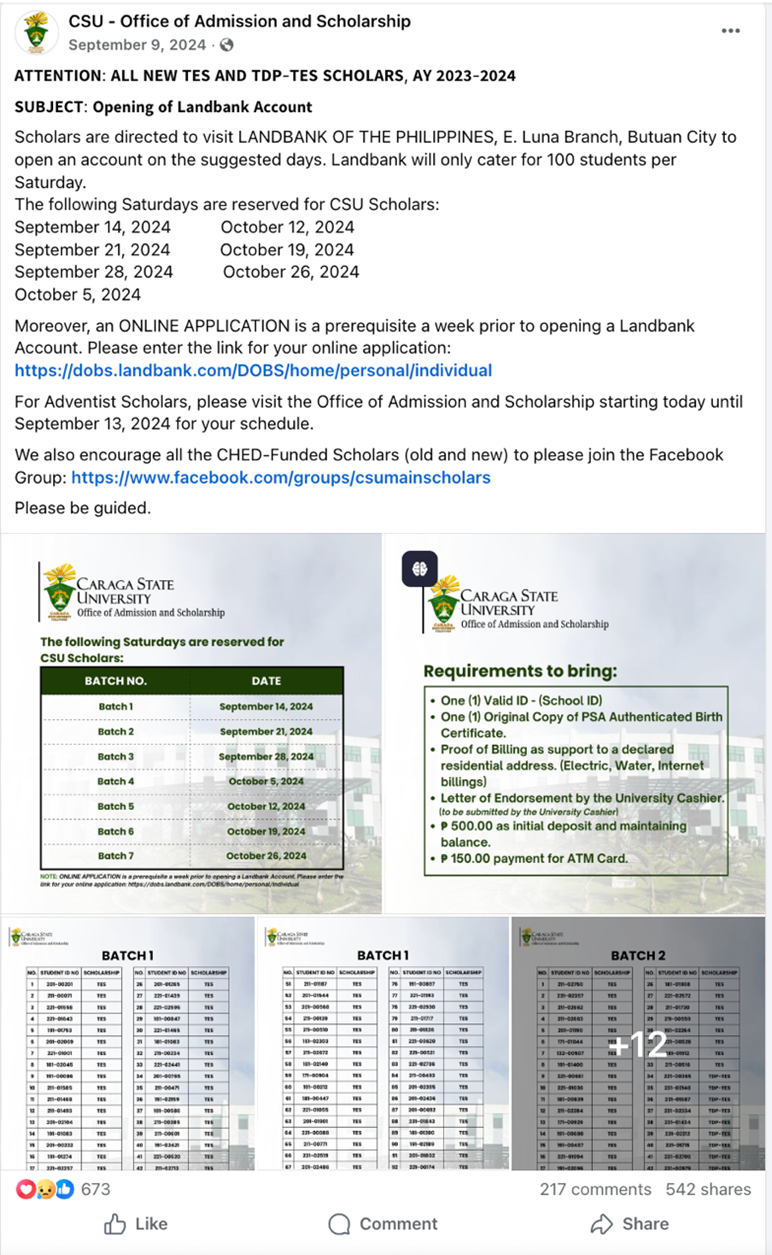
This figure states: 𝗔𝗧𝗧𝗘𝗡𝗧𝗜𝗢𝗡: 𝗔𝗟𝗟 𝗡𝗘𝗪 𝗧𝗘𝗦 𝗔𝗡𝗗 𝗧𝗗𝗣-𝗧𝗘𝗦 𝗦𝗖𝗛𝗢𝗟𝗔𝗥𝗦, 𝗔𝗬 𝟮𝟬𝟮𝟯-𝟮𝟬𝟮𝟰 𝗦𝗨𝗕𝗝𝗘𝗖𝗧: 𝗢𝗽𝗲𝗻𝗶𝗻𝗴 𝗼𝗳 𝗟𝗮𝗻𝗱𝗯𝗮𝗻𝗸 𝗔𝗰𝗰𝗼𝘂𝗻𝘁
Scholars are directed to visit LANDBANK OF THE PHILIPPINES, E. Luna Branch, Butuan City to open an account on the suggested days. Landbank will only cater for 100 students per Saturday.
The following Saturdays are reserved for CSU Scholars:
September 14, 2024 October 12, 2024
September 21, 2024 October 19, 2024
September 28, 2024 October 26, 2024
October 5, 2024
Moreover, an ONLINE APPLICATION is a prerequisite a week prior to opening a Landbank Account. Please enter the link for your online application: https://dobs.landbank.com/DOBS/home/personal/individual
For Adventist Scholars, please visit the Office of Admission and Scholarship starting today until September 13, 2024 for your schedule.
We also encourage all the CHED-Funded Scholars (old and new) to please join the Facebook Group: https://www.facebook.com/groups/csumainscholars
Please be guided.
University anti-poverty programmes
In the Philippines, universities play a significant role in addressing poverty through various anti-poverty programs and initiatives aimed at supporting students and communities. CSU also implements numerous programs that directly target livelihood generation, income improvement, skills development, and economic empowerment—core elements aligned with SDG 1: No Poverty.
CSU actively advances its commitment to SDG 1 by implementing targeted programmes that address the barriers faced by students from low-income and financially vulnerable households. The university supports greater access to higher education through strengthened admission pathways for students from disadvantaged backgrounds, complemented by initiatives that promote their academic success and well-being. CSU provides structured assistance—ranging from financial aid and scholarships to essential support services such as food, transportation, and guidance interventions—to ensure that financially challenged students are able not only to enroll but also to complete their studies. In addition, CSU extends its support to learners from low- and lower-middle-income countries through inclusive policies and assistance schemes. These efforts demonstrate CSU’s proactive approach to breaking intergenerational poverty by nurturing equitable access, sustained support, and successful completion for all students, regardless of socioeconomic standing.
CSU’s Anti-Poverty Programs:
1. Scholarship Programs and Financial Assistance
- Free Higher Education (RA 10931): Caraga State University offers free tuition and financial assistance through the Universal Access to Quality Tertiary Education Act, ensuring that students from low-income backgrounds can pursue higher education.
- Tertiary Education Subsidy (TES): This is part of the RA 10931 initiative and provides allowances for living expenses, books, and supplies to qualified students in both public and private higher education institutions.
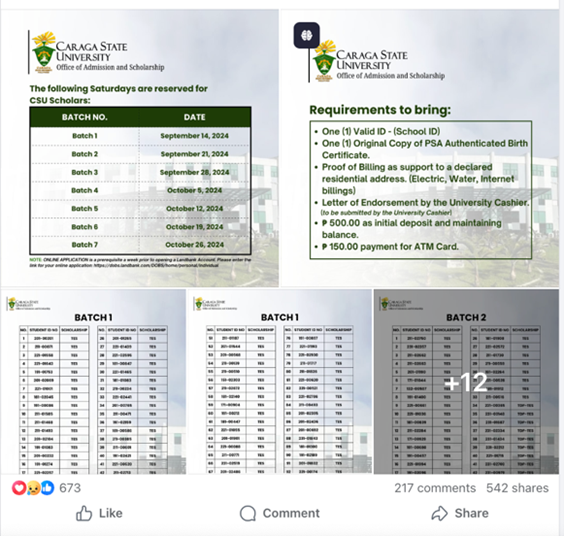

2. Social Entrepreneurship and Incubation Centers
- Social Enterprise Programs: Caraga State University, through the Department of Science and Technology (DOST)-funded Technology Business Incubators (Navigatu and Tara) promote social entrepreneurship that focuses on business models aimed at poverty reduction. Students are encouraged to develop and scale solutions that create jobs and stimulate economic growth in underserved areas.
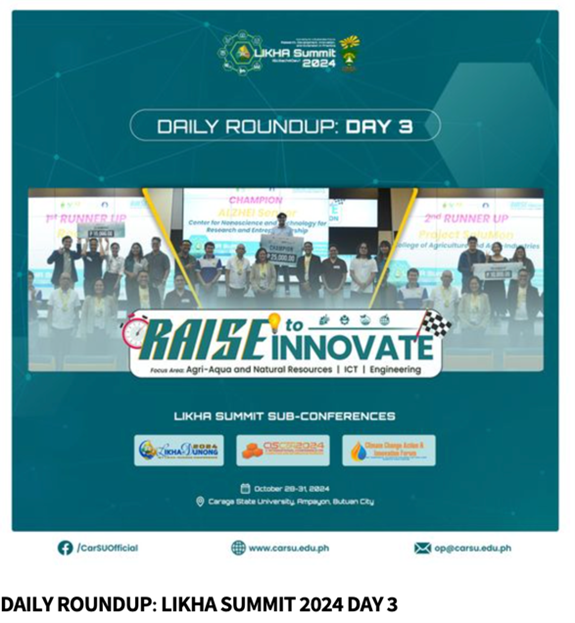 Link: DAILY ROUNDUP: LIKHA SUMMIT 2024 DAY 3
Link: DAILY ROUNDUP: LIKHA SUMMIT 2024 DAY 3 - Technology Business Incubators (TBIs): The Department of Science and Technology (DOST), in partnership with universities like Caraga State University, funds technology business incubators that support startups. There are two TBIs in CSU – Navigatu and Tara TBIs. These incubators often foster social innovation, which includes projects targeted at improving local livelihoods.
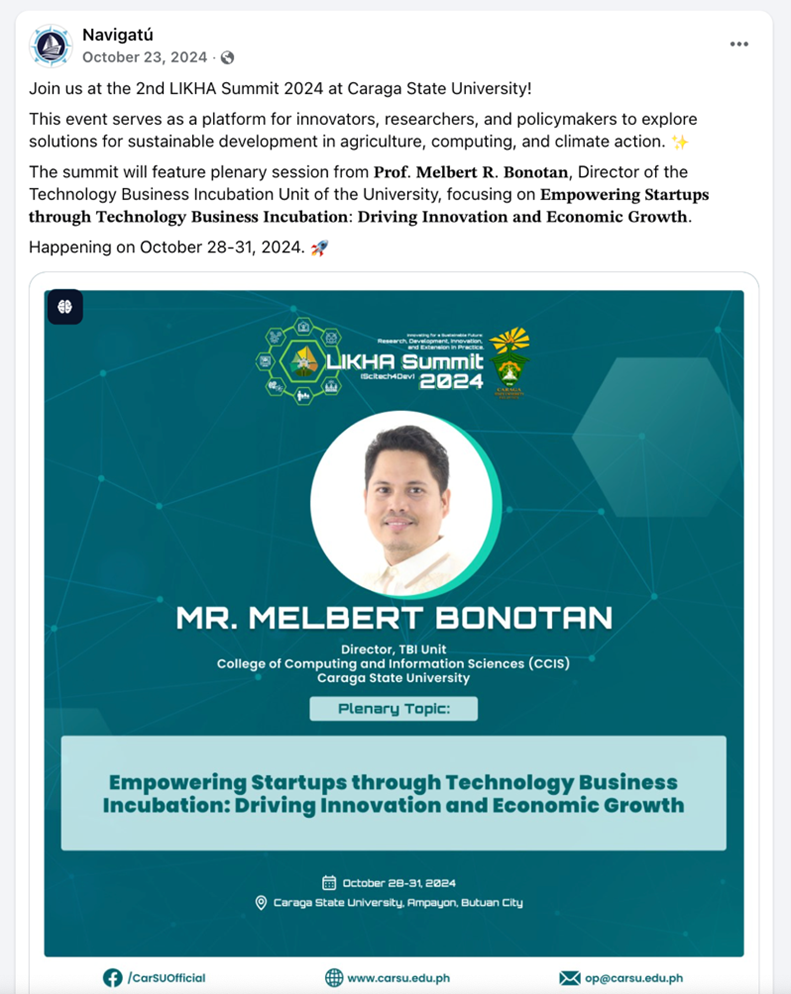 This event serves as a platform for innovators, researchers, and policymakers to explore solutions for sustainable development in agriculture, computing, and climate action. The summit will feature plenary session from 𝐏𝐫𝐨𝐟. 𝐌𝐞𝐥𝐛𝐞𝐫𝐭 𝐑. 𝐁𝐨𝐧𝐨𝐭𝐚𝐧, Director of the Technology Business Incubation Unit of the University, focusing on 𝐄𝐦𝐩𝐨𝐰𝐞𝐫𝐢𝐧𝐠 𝐒𝐭𝐚𝐫𝐭𝐮𝐩𝐬 𝐭𝐡𝐫𝐨𝐮𝐠𝐡 𝐓𝐞𝐜𝐡𝐧𝐨𝐥𝐨𝐠𝐲 𝐁𝐮𝐬𝐢𝐧𝐞𝐬𝐬 𝐈𝐧𝐜𝐮𝐛𝐚𝐭𝐢𝐨𝐧: 𝐃𝐫𝐢𝐯𝐢𝐧𝐠 𝐈𝐧𝐧𝐨𝐯𝐚𝐭𝐢𝐨𝐧 𝐚𝐧𝐝 𝐄𝐜𝐨𝐧𝐨𝐦𝐢𝐜 𝐆𝐫𝐨𝐰𝐭𝐡.
This event serves as a platform for innovators, researchers, and policymakers to explore solutions for sustainable development in agriculture, computing, and climate action. The summit will feature plenary session from 𝐏𝐫𝐨𝐟. 𝐌𝐞𝐥𝐛𝐞𝐫𝐭 𝐑. 𝐁𝐨𝐧𝐨𝐭𝐚𝐧, Director of the Technology Business Incubation Unit of the University, focusing on 𝐄𝐦𝐩𝐨𝐰𝐞𝐫𝐢𝐧𝐠 𝐒𝐭𝐚𝐫𝐭𝐮𝐩𝐬 𝐭𝐡𝐫𝐨𝐮𝐠𝐡 𝐓𝐞𝐜𝐡𝐧𝐨𝐥𝐨𝐠𝐲 𝐁𝐮𝐬𝐢𝐧𝐞𝐬𝐬 𝐈𝐧𝐜𝐮𝐛𝐚𝐭𝐢𝐨𝐧: 𝐃𝐫𝐢𝐯𝐢𝐧𝐠 𝐈𝐧𝐧𝐨𝐯𝐚𝐭𝐢𝐨𝐧 𝐚𝐧𝐝 𝐄𝐜𝐨𝐧𝐨𝐦𝐢𝐜 𝐆𝐫𝐨𝐰𝐭𝐡.Held on October 28-31, 2024
Link: https://www.facebook.com/share/p/17VcHqvA8Z/
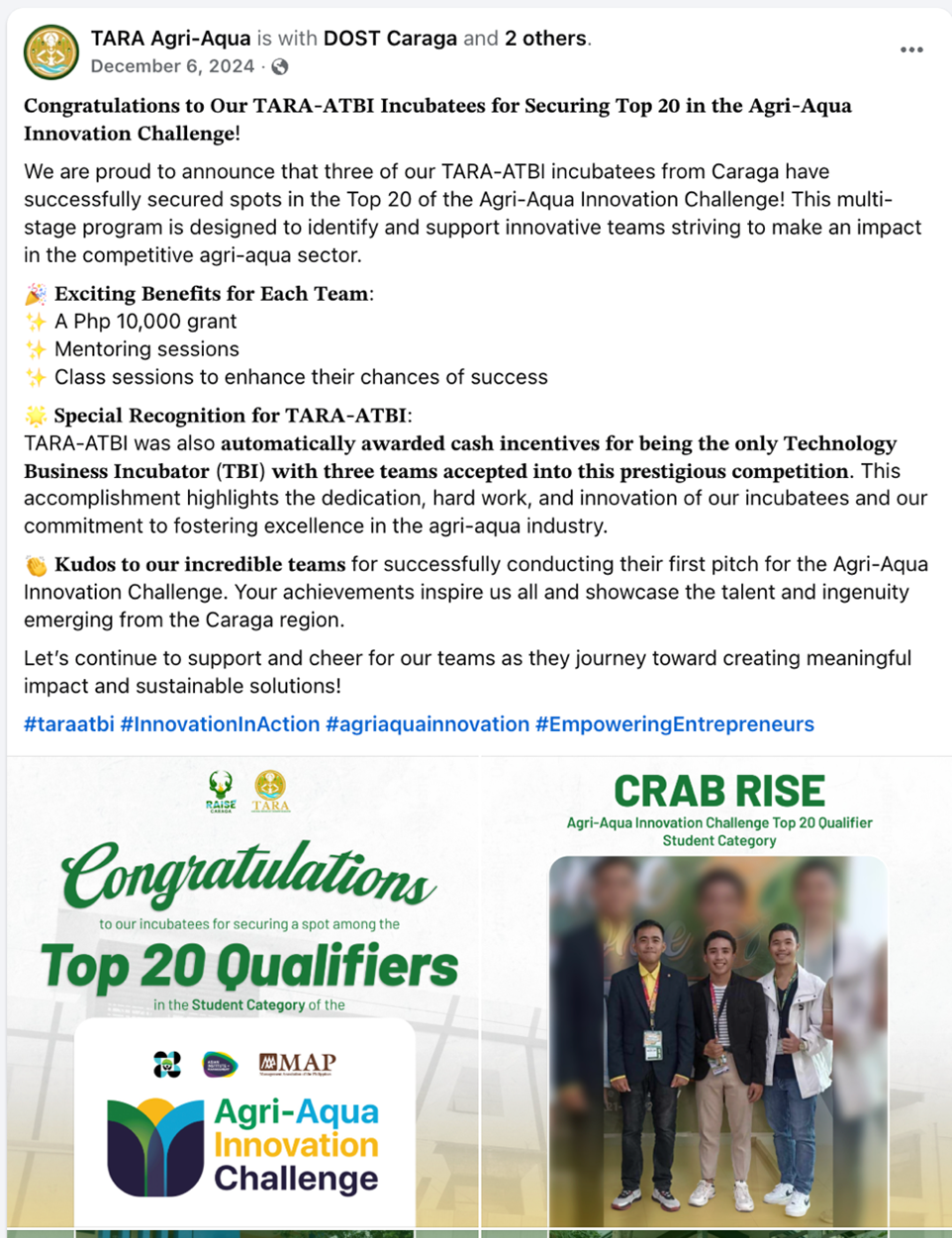
The image states that: “We are proud to announce that three of our TARA-ATBI student incubatees from Caraga have successfully secured spots in the Top 20 of the Agri-Aqua Innovation Challenge! This multi-stage program is designed to identify and support innovative teams striving to make an impact in the competitive agri-aqua sector.
🎉 𝐄𝐱𝐜𝐢𝐭𝐢𝐧𝐠 𝐁𝐞𝐧𝐞𝐟𝐢𝐭𝐬 𝐟𝐨𝐫 𝐄𝐚𝐜𝐡 𝐓𝐞𝐚𝐦:
✨ A Php 10,000 grant
✨ Mentoring sessions
✨ Class sessions to enhance their chances of success
🌟 𝐒𝐩𝐞𝐜𝐢𝐚𝐥 𝐑𝐞𝐜𝐨𝐠𝐧𝐢𝐭𝐢𝐨𝐧 𝐟𝐨𝐫 𝐓𝐀𝐑𝐀-𝐀𝐓𝐁𝐈:
TARA-ATBI was also 𝐚𝐮𝐭𝐨𝐦𝐚𝐭𝐢𝐜𝐚𝐥𝐥𝐲 𝐚𝐰𝐚𝐫𝐝𝐞𝐝 𝐜𝐚𝐬𝐡 𝐢𝐧𝐜𝐞𝐧𝐭𝐢𝐯𝐞𝐬 𝐟𝐨𝐫 𝐛𝐞𝐢𝐧𝐠 𝐭𝐡𝐞 𝐨𝐧𝐥𝐲 𝐓𝐞𝐜𝐡𝐧𝐨𝐥𝐨𝐠𝐲 𝐁𝐮𝐬𝐢𝐧𝐞𝐬𝐬 𝐈𝐧𝐜𝐮𝐛𝐚𝐭𝐨𝐫 (𝐓𝐁𝐈) 𝐰𝐢𝐭𝐡 𝐭𝐡𝐫𝐞𝐞 𝐭𝐞𝐚𝐦𝐬 𝐚𝐜𝐜𝐞𝐩𝐭𝐞𝐝 𝐢𝐧𝐭𝐨 𝐭𝐡𝐢𝐬 𝐩𝐫𝐞𝐬𝐭𝐢𝐠𝐢𝐨𝐮𝐬 𝐜𝐨𝐦𝐩𝐞𝐭𝐢𝐭𝐢𝐨𝐧. This accomplishment highlights the dedication, hard work, and innovation of our incubatees and our commitment to fostering excellence in the agri-aqua industry.”
3. Research and Development Initiatives
- Poverty Alleviation Studies: Caraga State University conducts research on poverty reduction strategies, helping inform policymakers and implement sustainable development projects. Based on the 2024 OVPRDIE Annual Accomplishment Report on page 28, the section that explicitly contains Poverty Alleviation Studies appears in the discussion of the socio-economic conditions of smallholder farmers, particularly those who remain within or below the poverty line despite increases in livelihood activities such as tree farming. This part of the report directly situates CSU’s research within the context of poverty, describing findings that smallholder tree farmers in Caraga “remained within the poverty line and marginalized,” and highlighting the need to understand their economic vulnerability and improve their entrepreneurial conditions. These studies—centered on smallholder falcata farmers, their income, market conditions, and livelihood constraints—are the clearest portion of the 2024 RDIE Report addressing poverty alleviation as a research agenda.Link: https://sustainability.carsu.edu.ph/?page_id=1823
- Agricultural and Rural Development: Caraga State University actively engage in research to improve crop productivity and sustainable farming practices, directly benefiting farmers and rural communities.According to our 2024 OVPRDIE Annual Accomplishment Report, the parts of the document that clearly address Agricultural and Rural Development are found in several sections that describe CSU’s work in sustainable agriculture, agroforestry, food security, biotechnology adoption, and rural community capacity-building. These sections collectively demonstrate the university’s contributions to improving agricultural productivity, strengthening farming systems, and enhancing rural livelihoods.
One major portion is the discussion of sustainable agriculture and ecosystem management featured during the GEO-STEMS Symposium, which highlights the use of geospatial technologies to advance agricultural monitoring and land management initiatives. This appears on page 63 of the report, where CSU and international experts present strategies for improving agricultural practices in Caraga through remote sensing and spatial analysis.
Another key section is the documentation of the Communication Pathways of Falcata Adoption Among Farmers in Agusan del Sur, found on pages 25–26. This research focuses directly on farmer livelihoods, income resilience, and agroforestry-based rural economic development—explicitly contributing to agricultural and rural development goals.
Further, the Extension Services segment includes multiple agricultural and rural community projects. Examples include vegetable seedling distribution supporting food security programs, and technology transfer initiatives such as Sago Processing Technology, which strengthen local agro-industries. These appear on pages 95–96 of the report and demonstrate CSU’s active role in improving rural livelihoods and strengthening agricultural value chains.
Thus, the sections on pages 25–26, 63, and 95–96 collectively represent the portions of the 2024 Annual Report that directly pertain to Agricultural and Rural Development.
4. Livelihood and Skills-Based Training Programs
A large portion of CSU’s community extension work consists of livelihood-enhancing training, such as:
- Baking Livelihood Skills Extension Projects (multiple weeks)
- Silk Screen Printing Skills Training
- Welding and Fabrication Technology Training
- Light Vehicle Driving with Engine Tune-Up Training
CSU’s livelihood and skills-based training programs form a core component of its anti-poverty initiatives, equipping communities with practical competencies that directly translate to income-generating opportunities. Through its multi-week Baking Livelihood Skills Extension Projects, participants—many of whom are unemployed or underemployed—gain the capacity to produce bakery products for home-based or small-scale enterprise ventures. Complementing this are the Silk Screen Printing Skills Trainings, which introduce trainees to a low-capital livelihood activity that can support microbusiness formation or supplement household income through customized printing services. The university likewise offers Welding and Fabrication Technology Training, providing recipients with technical skills that are in demand in local construction and repair services, thereby expanding employment prospects for individuals without formal trade certification. Additionally, the Light Vehicle Driving with Engine Tune-Up and Preventive Maintenance Trainings enhance participants’ employability in transportation and logistics sectors while enabling them to engage in freelance driving or vehicle repair services. Collectively, these programs strengthen household economic resilience by broadening skill sets, promoting self-employment, and nurturing community-based microenterprises.
These recurring activities all serve to provide income-generating skills for unemployed or underemployed individuals.
These livelihood-enhancing programs appear in the 2024 OVPRDIE Annual Accomplishment Report on pages 90–92 with link: 2024 RDIE Annual Report)
5. Agricultural Productivity and Farmer Support Programs
Agriculture-related programs support smallholder farmers in improving productivity and increasing income. These include:
- Addressing Virus Diseases in Abaca Production (multiple training batches)
- Training on Irrigated Lowland Rice Production and Management
- Coffee Farming Technologies & Pest Management Training
- CAA-LIFE Ruminant Feeding and Basic Health Management
- Agrimmunity: Vegetable Seedling Production and Nursery Establishment
These projects enhance farmers’ capacity to increase yields and reduce losses—directly supporting poverty reduction.
The agricultural productivity and farmer-support programs appear on pages 61–64, 95, and 99 of the 2024 OVPRDIE Annual Accomplishment Report, based on the listed training batches, agricultural capacity-building activities, livestock management trainings, and the Agrimmunity project.
Link: 2024 RDIE Annual Report)
6. Technology Transfer Programs that Improve Livelihood
CSU implements several R&D-based technologies provided to communities, MSMEs, and rural industries:
- Sago Processing Technology – Phase 2
- Product Development and Enhancement Training for MSMEs
- Mastering the Basics: Fruit Preserve Production Technology
- Food Safety & Good Manufacturing Practices (GMP) workshops
These programs help micro-entrepreneurs increase revenue opportunities, add value to local products, and enter broader markets.
Link: 2024 RDIE Annual Report)
7. Financial Literacy and Microenterprise Development Programs
CSU implements multiple financial empowerment activities, such as:
- Financial Literacy Training
- Training on Financial Management for MSMEs
- Unlocking Property Rights: Land Titling Seminars
Financial literacy and property rights education help families protect assets, manage income effectively, and build long-term financial stability.
These financial literacy and microenterprise development programs appear on pages 91–92 of the 2024 OVPRDIE Annual Accomplishment Report.
Link: 2024 RDIE Annual Report)
8. Social Welfare, Community Development, and Health-Oriented Programs
Although not directly economic, these programs support vulnerable sectors—indirectly contributing to poverty reduction:
- PASA Extension Program: Social welfare support, health issue prevention, advocacy training
- Community-Based Psychosocial Support for Rural Communities
Supports vulnerable families, especially women and crisis-affected communities - Medicinal Plants and Traditional Healthcare Practices (Pagatpatan Community)
Provides health self-sufficiency in low-income households
These three programs appear on pages 24–26 and 100 of the 2024 OVPRDIE Annual Report, and pages 100–102 of the 2024 Extension Services Narrative Report.
Link: 2024 RDIE Annual Report)
9. Education-Oriented Poverty Alleviation Programs
Programs that enhance teacher and student capacities contribute to long-term poverty reduction through human capital development:
- PROJECT READINNG: For struggling young readers from low-income households
- Training for Mathematics Faculty / PAR Development Workshops
Build teacher capability in underserved schools
These education-oriented poverty alleviation programs—Project READINNG and the Mathematics Faculty / PAR Development Workshops—appear on pages 112–123 of the 2024 Extension Services Narrative Report.

Link: https://sustainability.carsu.edu.ph/?page_id=1570#2024-Extension-Services-Narrative-Report
10. Partnerships Supporting Sustainable Livelihood Programs (SLP)
CSU partners with DSWD-SLP and local livelihood groups to uplift marginalized communities:
- Capacity building for Sustainable Livelihood Program (SLP) implementers
- MOA with DOST-Caraga and Kaba-ang Livelihood Association
Supports long-term livelihood enhancement
These social welfare, psychosocial, and community health programs appear on pages 94, 77, and 239 of the 2024 OVPRDIE Extension and RDIE reports.
Link: 2024 RDIE Annual Report
Link: https://sustainability.carsu.edu.ph/?page_id=1570#2024-Extension-Services-Narrative-Report
11. Community Extension Programs
- Livelihood Training and Workshops: Caraga State University has extension programs that offer skills training and livelihood workshops for marginalized communities. These programs help improve income-generating capabilities by teaching practical skills like entrepreneurship, handicrafts, and farming techniques.
- Outreach Programs for Indigenous Communities: Caraga State University engages with indigenous communities by providing education, healthcare, and social services, contributing to their empowerment and economic stability.
You can find the relevant “Community Extension Programs” and “Outreach Programs for Indigenous Communities” on:
- 92–93 — Livelihood training and community skills workshops
- 43–45 — Outreach and capacity-building activities for Indigenous communities
Link: 2024 RDIE Annual Report
12. Feeding and Nutrition Programs
- School Feeding Initiatives: CSU partners with government agencies such as the Department of Education (DepEd) and Department of Social Welfare and Development (DSWD) to implement nutrition and feeding programs for students in areas with high malnutrition rates. This helps improve health and educational outcomes for children from low-income families.Caraga State University (CSU) implements a regular “Pause-to-Pass” activity. The latest for the year 2024 was October 2024 which provided free food to students during midterm exams. This appears to be a specific, short-term initiative rather than a continuous, formal feeding program.
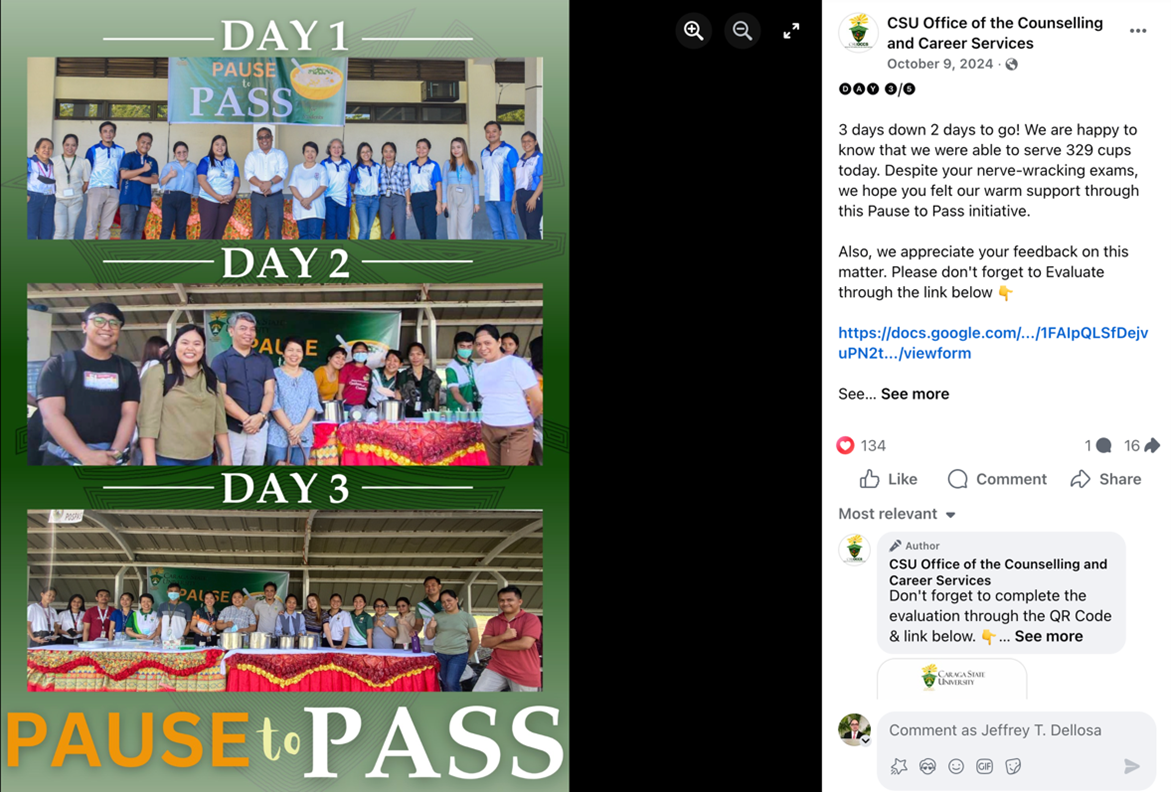
This image says: “We are happy to know that we were able to serve 329 cups today. Despite your nerve-wracking exams (students), we hope you felt our warm support through this Pause to Pass initiative.”
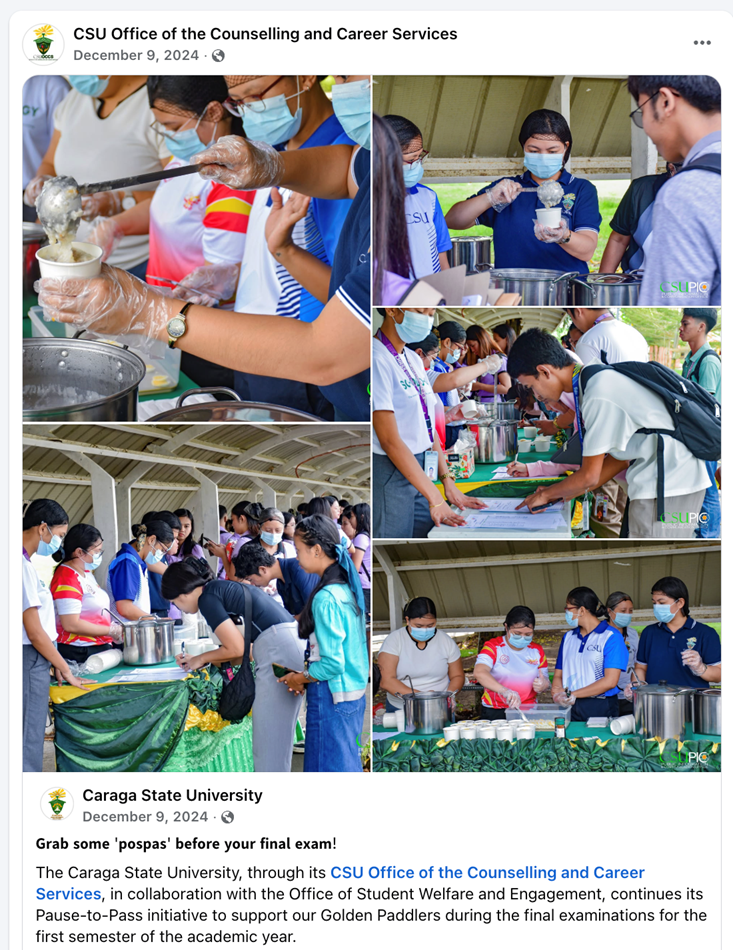
This photo states: “𝗚𝗿𝗮𝗯 𝘀𝗼𝗺𝗲 ‘𝗽𝗼𝘀𝗽𝗮𝘀’ 𝗯𝗲𝗳𝗼𝗿𝗲 𝘆𝗼𝘂𝗿 𝗳𝗶𝗻𝗮𝗹 𝗲𝘅𝗮𝗺!
The Caraga State University, through its CSU Office of the Counselling and Career Services, in collaboration with the Office of Student Welfare and Engagement, continues its Pause-to-Pass initiative to support our Golden Paddlers during the final examinations for the first semester of the academic year.
Pause-to-Pass provides free porridge (pospas) to all Golden Paddlers on campus. Following the success of the first leg during the midterm examination week last October 7-11, 2024, this initiative returns for the finals season.
The porridge station is located in the hallway, across from the HERO Learning Commons, from December 9 to 13, 2024, every morning until supplies last. To promote sustainability and reduce waste, students are encouraged to bring their own cups.”
13. Student Assistantships and Work-Study Programs
- On-Campus Employment: Caraga State University provides on-campus work opportunities for students to support themselves financially while completing their studies. This reduces the financial burden and helps students gain valuable work experience.
14. Sustainable Development Projects
- Eco-Social Programs: Caraga State University has environmental courses and an RDI Center in CREME that integrates environmental conservation projects with community development to ensure long-term socio-economic benefits.The Eco-Social Programs under Sustainable Development Projects can be found on pages 40–41 of the 2024 OVPRDIE Annual Accomplishment Report.
Summary — CSU’s Anti-Poverty Programs for students and our community (2024)
Based on the reports, CSU’s anti-poverty initiatives fall into seven major clusters:
- Student Scholarships and Financial Programs
- Livelihood & skills development programs (baking, welding, silk-screening, driving, fabrication)
- Agriculture & farmer income improvement programs (abaca, rice, coffee, livestock, vegetable nursery)
- Technology transfer for community enterprises (sago processing, food processing, product development)
- Financial literacy & enterprise management programs
- Social welfare & health support for vulnerable sectors
- Education capability-building for teachers and students
- Partnership-driven livelihood support (SLP, DOST livelihood groups)
These programs collectively form the university’s SDG 1 (No Poverty) ecosystem, directly targeting income generation, economic empowerment, community enterprise development, and long-term human capital strengthening.
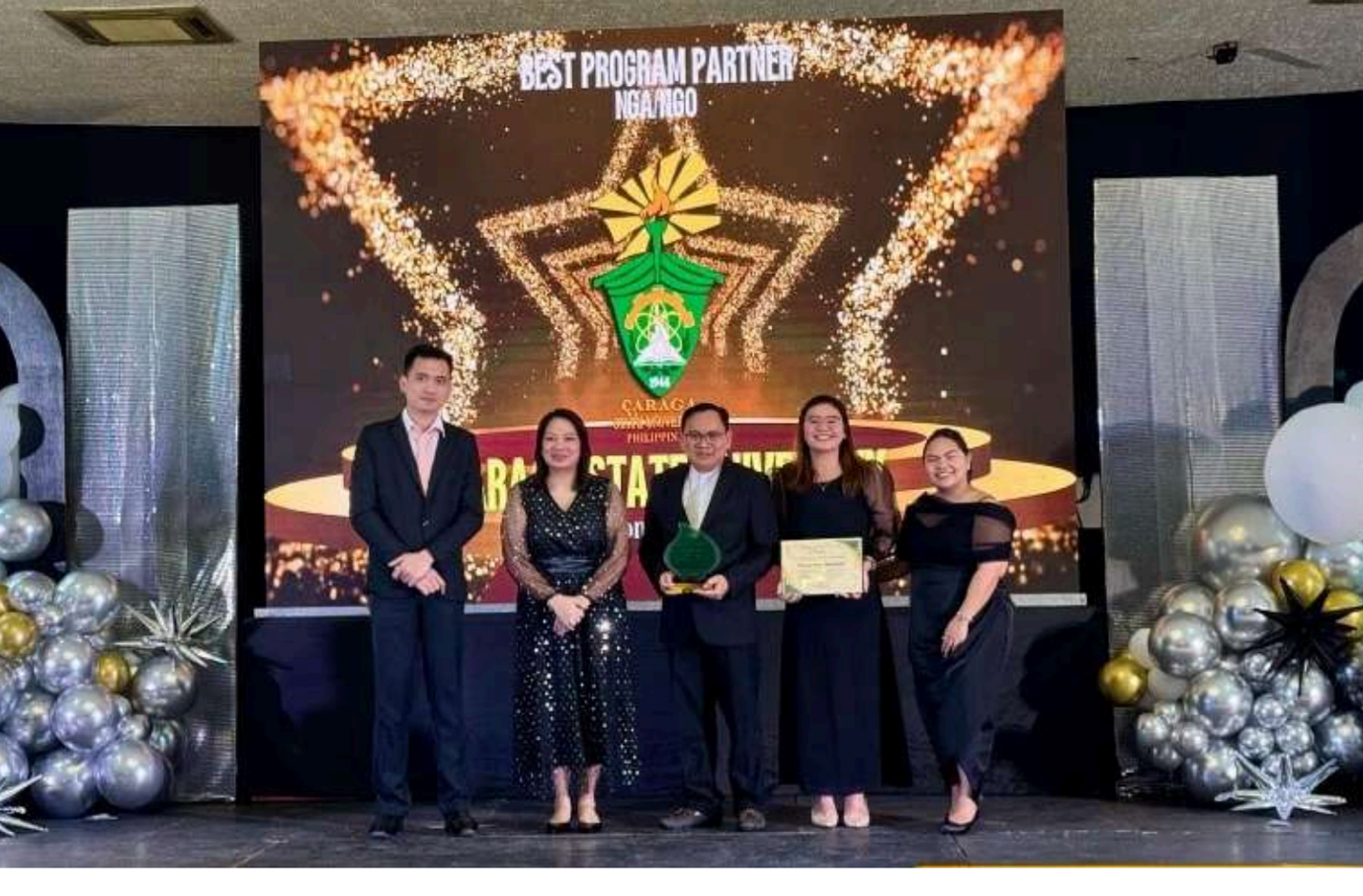
The Caraga State University was recognized as the Best Program Partner-NGA/NGO for commendable support and exemplar contribution to Sustainable Livelihood Program for CY 2024 and received trophy of Kabalikat Award under Public Partner Category as Most Outstanding Partner. This given on 13th day of December 2024 at Doties Place, Butuan City. The event was attended by our Extension Director Dr. Romell A. Seronay together with TTLO/ITSO Chief Charisse D. Galusan.
These programs collectively support students and local communities, providing pathways out of poverty and contributing to inclusive growth and sustainable development in the Philippines.
Bottom financial quintile admission target. Targets to admit students who fall into the bottom 20% of household income group (or a more tightly defined target) in the country.
Caraga State University (CSU) has implemented several initiatives to support students from low-income households, particularly those in the bottom 20% of the income distribution. These efforts are evident in their admission policies and scholarship programs.
- Affirmative Action Plan (AAP): CSU offers an Affirmative Action Plan designed to provide additional opportunities for students who did not pass the university admission test. This plan aims to increase access to higher education for underrepresented and economically disadvantaged students.
- Office for Admission and Scholarship (OAS): The OAS at CSU supervises admission strategies and scholarship programs that align with the university’s enrollment objectives. It collaborates with college deans to optimize the impact of institutional and foundation scholarships, ensuring that financial aid reaches students in need.
- Admission Requirements: As part of the admission process, CSU requires applicants to submit a photocopy of their parents’ Income Tax Return or a certificate from the Bureau of Internal Revenue (BIR). This documentation helps the university assess the financial status of applicants and identify those from low-income families who may qualify for financial assistance or scholarships.
These measures demonstrate CSU’s commitment to admitting and supporting students from the bottom financial quintile, thereby promoting inclusivity and equal access to education.
Bottom financial quintile student success
Graduation/completion targets for students who fall into the bottom 20% of the household income group (or a more tightly defined target) in the country.
Caraga State University (CSU) is committed to supporting the academic success of students from low-income households, particularly those in the bottom 20% of the income distribution. To enhance their graduation and completion rates, CSU has implemented several initiatives:
- Scholarship Programs: CSU offers various scholarships aimed at financially disadvantaged students, providing them with the necessary resources to complete their education. These scholarships cover tuition fees and may include stipends for living expenses, reducing the financial burden on students and their families. Link: carsu.edu.ph;
- Academic Support Services: The university provides tutoring, mentoring, and counseling services to assist students in overcoming academic challenges. These support systems are designed to help students maintain satisfactory academic progress and stay on track for graduation.
- Monitoring and Evaluation: CSU has established mechanisms to monitor the academic performance and progression of students from low-income backgrounds. Regular assessments allow for timely interventions, ensuring that students receive the support they need to succeed.
These initiatives reflect CSU’s dedication to fostering an inclusive educational environment where all students, regardless of their financial background, have the opportunity to achieve academic success.
Low-income student support
Provide support (e.g. food, housing, transportation, legal services) for students from low-income families to enable them to complete university.
Caraga State University (CSU) offers a range of support services to assist students from low-income families in completing their education. These services include:
1. Scholarships and Financial Assistance: CSU provides various scholarships and financial aid programs to alleviate the financial burden on students. These programs are designed to cover tuition fees and may include stipends for living expenses. The Office of Student Affairs and Services (OSAS) oversees these initiatives, ensuring that eligible students receive the necessary support.
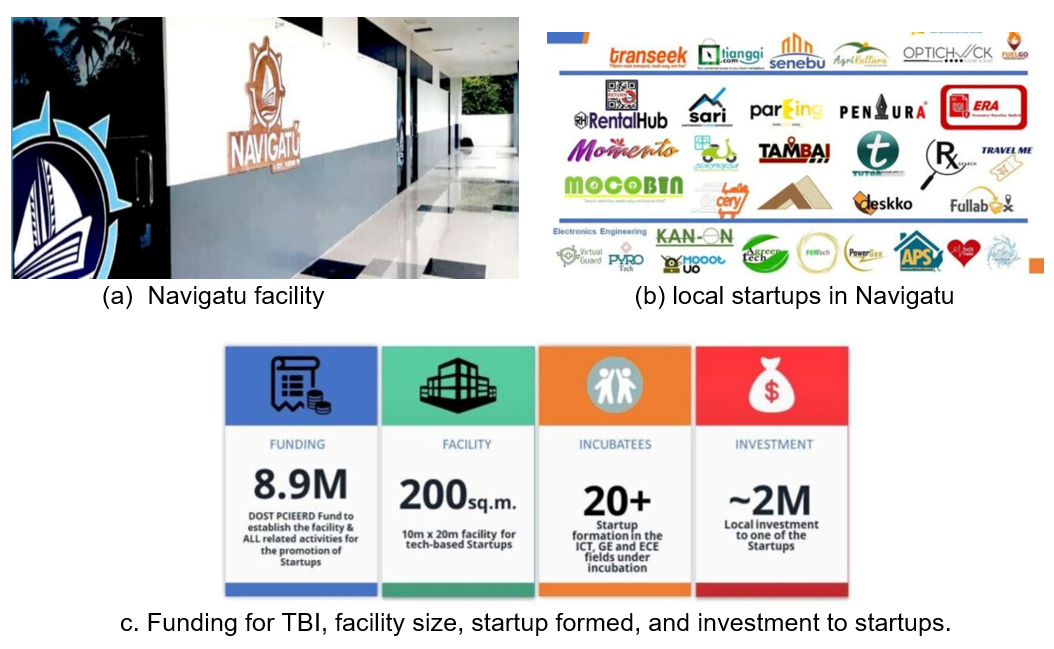
2. Student Housing: The university offers affordable and safe housing options for students. These accommodations are conducive to learning and are managed to ensure a secure living environment. The OSAS is responsible for coordinating these housing services.
Document Link: https://www.carsu.edu.ph/?q=content%2Foffice-student-affairs-and-services-osas;
Document Link: https://www.carsu.edu.ph/?q=content%2Fprograms-and-services
CSU also outlined the establishment of a Ladies and Gents Dormitory on its campus in Ampayon, Butuan City. This project, valued at approximately PHP 19.3 million, aimed to provide on-campus housing facilities to support the well-being and academic pursuits of its students. The initiative falls under the responsibility of CSU’s Bids and Awards Committee (BAC), which oversaw the tendering process in accordance with Republic Act No. 9184 and its Implementing Rules and Regulations (IRR). This ensures that all stages, from bid submission and evaluation to the eventual awarding and signing of the contract, are conducted transparently and adhere to national procurement standards.
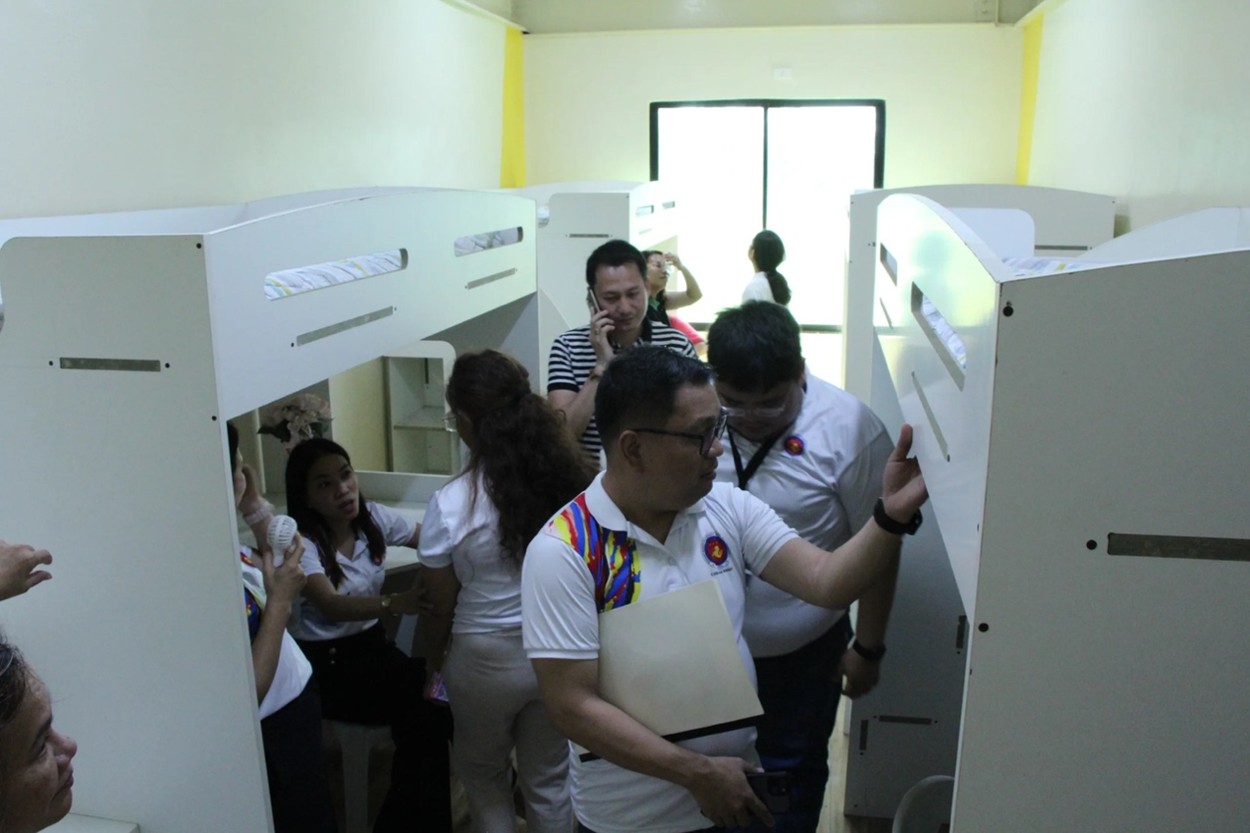
The construction timeline for the dormitory was set at 270 calendar days, starting with pre-procurement conferences and including scheduled activities such as bid advertising, pre-bid conferences, and bid opening. Interested bidders were required to provide a bid security, ranging from 2% to 30% of the approved budget for the contract, depending on the type of security instrument used. The dormitory is expected to significantly contribute to the CSU campus by offering safe and affordable accommodation, facilitating a better learning environment, and fostering a sense of community among the students.
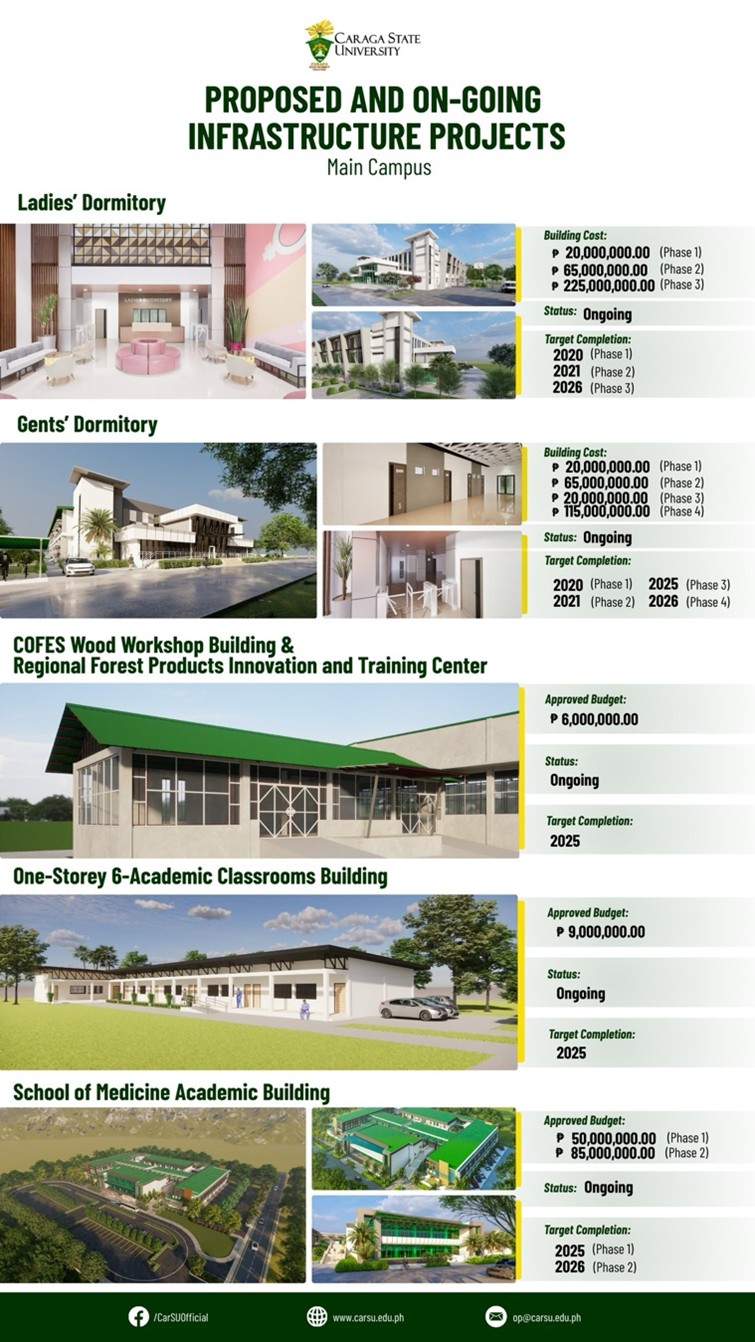
3. Food Services: CSU provides accessible food services on campus to ensure that students have access to nutritious meals. These services are designed to be affordable, catering to the needs of students from various financial backgrounds.

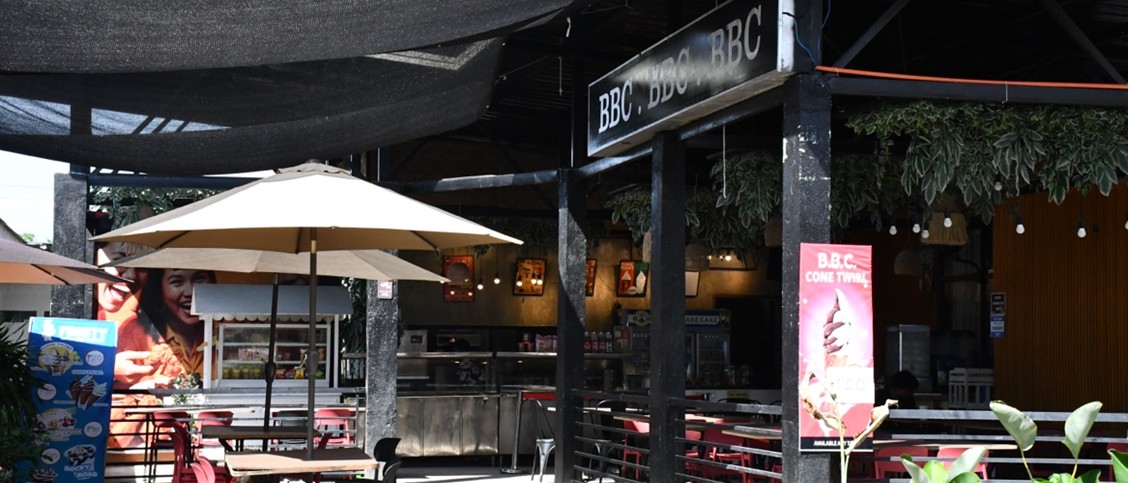
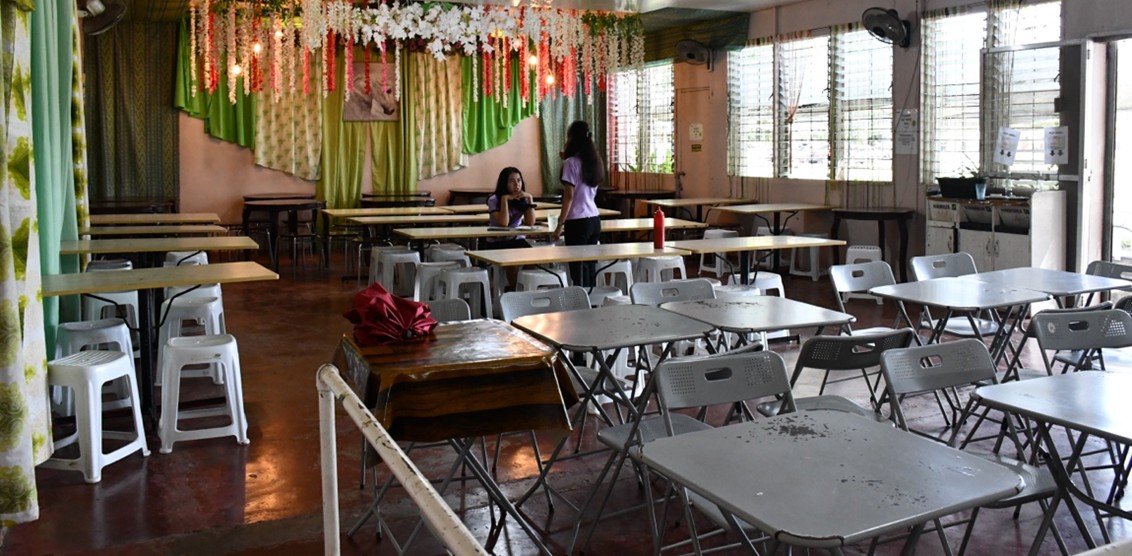
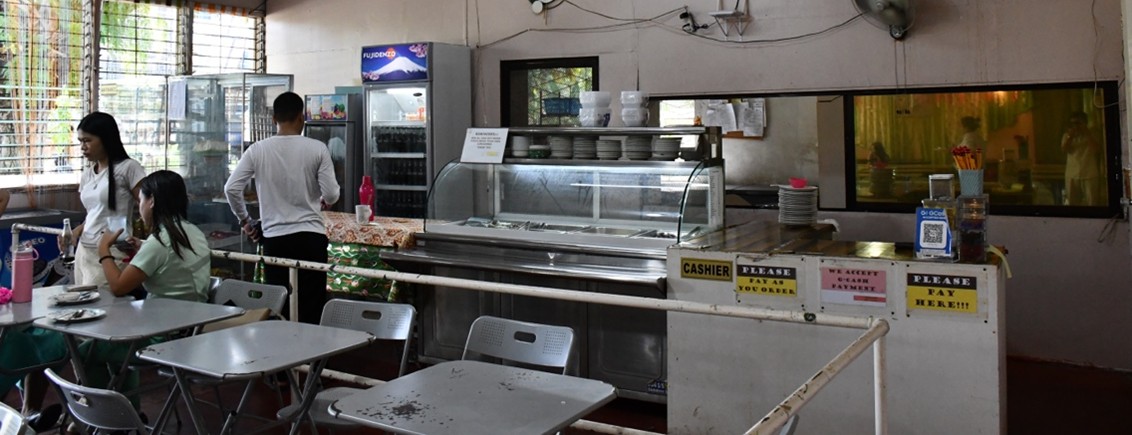
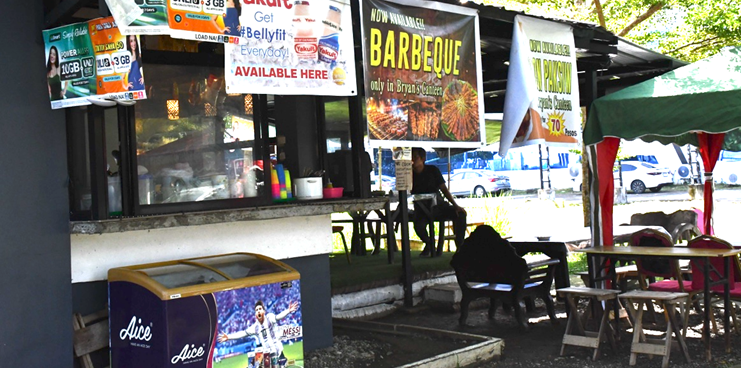
The above images are proof of the available student canteens, which are accessible to students.
Document Link: CARSU Student Services Page
5. Transportation Assistance: While specific transportation programs are not detailed, CSU’s comprehensive support system aims to address various student needs, potentially including transportation assistance for those from low-income families, with special fare discounts. CSU also promotes the use of bicycles in the university for environment and pollution free transportation in the university.
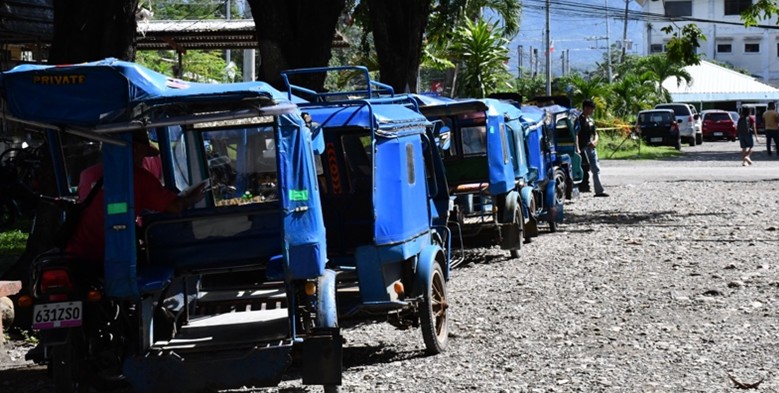
Tricycles shown above are being used as one of the primary mode of transport over the years inside the 200 plus hectare university campus.

Bicycle use is being promoted in the campus.
6. Counselling and Legal Services: The university offers guidance and counseling services that may include assistance with legal matters affecting students. These services are part of CSU’s commitment to student welfare and are managed by the OSAS.
Document Link: CARSU Student Services Page
These support mechanisms reflect CSU’s dedication to creating an inclusive educational environment, ensuring that all students have the resources necessary to succeed academically.
Low or lower-middle-income countries student support
Schemes to support poor students from low or lower-middle-income countries (e.g. offering free education, grants).
Caraga State University (CSU) offers various support mechanisms to assist students from low-income backgrounds, including those from low or lower-middle-income countries. These initiatives aim to provide financial assistance and create an inclusive educational environment. Key programs include:
1. University-Funded Scholarship Programs. CSU provides scholarships to deserving students, categorized into merit-based and non-merit-based programs. Merit scholarships are awarded based on academic performance, while non-merit scholarships support students actively engaged in specific areas of expertise.
Document Link: CARSU Office of Admission and Scholarship
2. Government-Funded Scholarship Programs. The university facilitates access to various government-funded scholarships, such as the Commission on Higher Education (CHED) Full Merit and Half Merit programs, Iskolar ng Bayan, and others. These programs offer financial support to students, helping to cover tuition fees and other educational expenses.
Document Link: CARSU Office of Admission and Scholarship
3. Office for Admission and Scholarship (OAS). The OAS supervises admission strategies and scholarship programs, ensuring the development and successful implementation of initiatives that support the university’s enrollment objectives. The office assists in screening applicants for various scholarships and financial assistance programs, helping to prepare and process necessary documents for fund release.
Document Link: CARSU Office of Admission and Scholarship
4. Student Assistant Program
The Student Assistantship (SA) Program is a university-based employment and financial assistance scheme offered by Caraga State University to support deserving students through part-time work opportunities within the institution. It allows qualified students to gain practical work experience while receiving an honorarium. To be eligible, applicants must have completed at least their first year of study, be currently enrolled as bona fide CSU students, possess good academic standing, and must not be recipients of any other scholarship or financial aid. Under this program, student assistants receive a monthly honorarium of Php 2,500, equivalent to 100 hours of rendered service, and are assigned to various offices where they can develop workplace skills, contribute to university operations, and enhance their sense of responsibility and productivity.
Link: Office of Admission and Scholarship
These programs and services demonstrate CSU’s commitment to supporting students from low-income backgrounds, including those from low or lower-middle-income countries, by providing financial assistance and fostering an inclusive educational environment.
COMMUNITY ANTI-POVERTY Programs
Local start-up assistance
Provide assistance in the local community, supporting the start-up of financially and socially sustainable businesses through relevant education or resources (e.g. mentorship programmes, training workshops, access to university facilities often for free and funded by the university).
Caraga State University (CSU) actively engages in community development by supporting the establishment of financially and socially sustainable businesses. The university offers various programs and resources often for free (without payment) to assist local entrepreneurs, including students:
a. Bachelor of Science in Entrepreneurship Program: CSU’s College of Business and Accountancy offers a Bachelor of Science in Entrepreneurship, designed to equip students with the skills necessary to initiate and manage successful business ventures. The program emphasizes practical knowledge and entrepreneurial competencies, preparing graduates to contribute to local economic development.
Document Link: https://www.csucc.edu.ph/programs-offered/
b. Technology Business Incubators: Navigatu and Tara
- Navigatu: Established in 2018, Navigatu is a technology business incubator funded by the Department of Science and Technology (DOST) and hosted by CSU. It aims to foster innovation and entrepreneurship within the Caraga region by providing startups with free essential resources, mentorship, and networking opportunities.
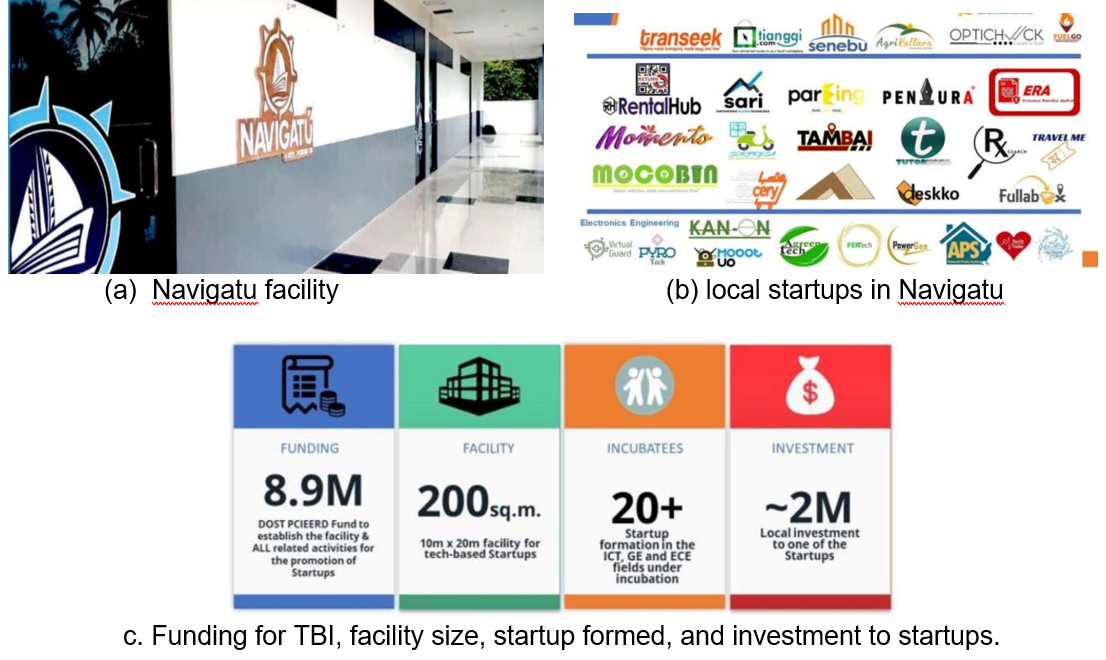
- Navigatu focuses on sectors such as fishing, agri-forestry, minerals, and ecotourism, aligning with the region’s economic strengths.
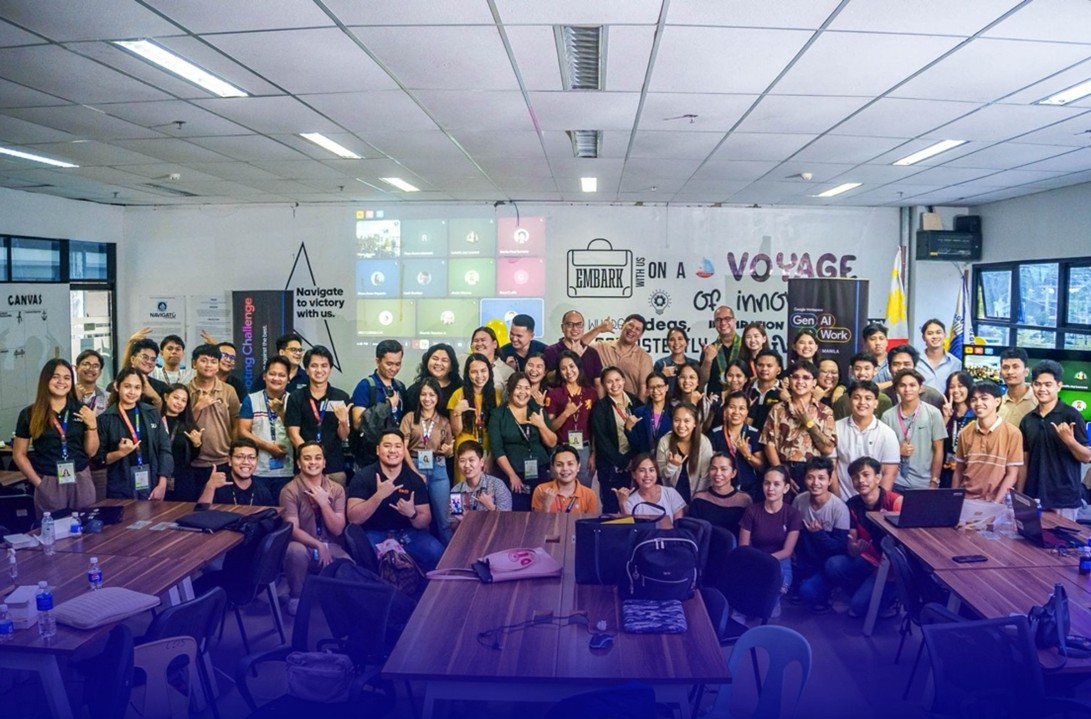
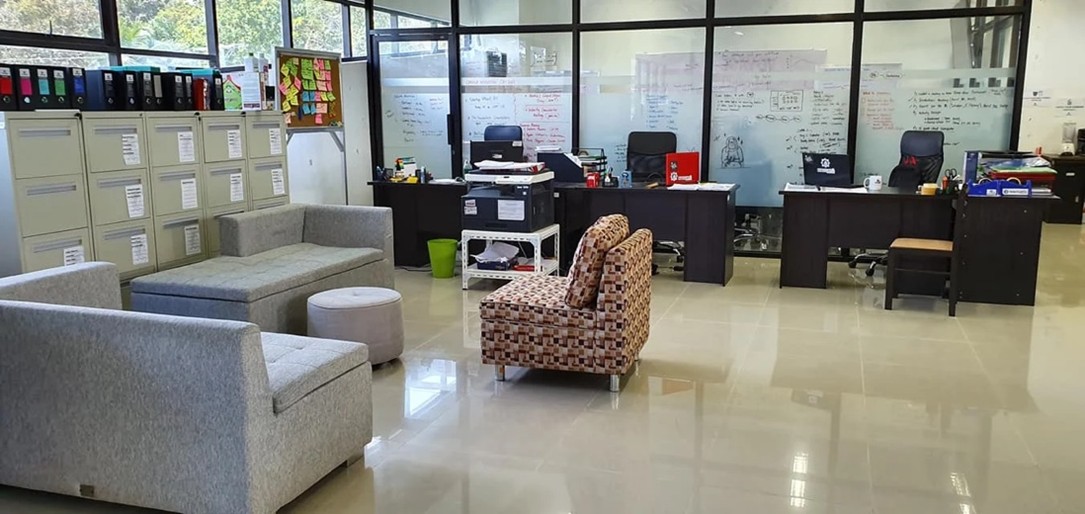
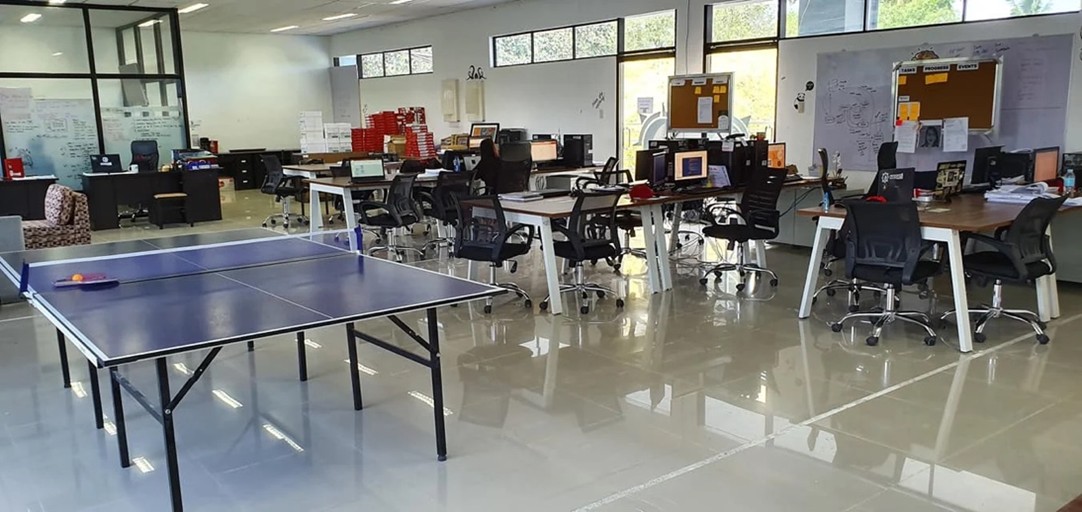 Document Link: https://www.facebook.com/navigatu;
Document Link: https://www.facebook.com/navigatu;Document Link: https://www.isip-ph.com/
Document Link: https://stellarph.io/ecosystem/navigatu
https://www.researchgate.net/;
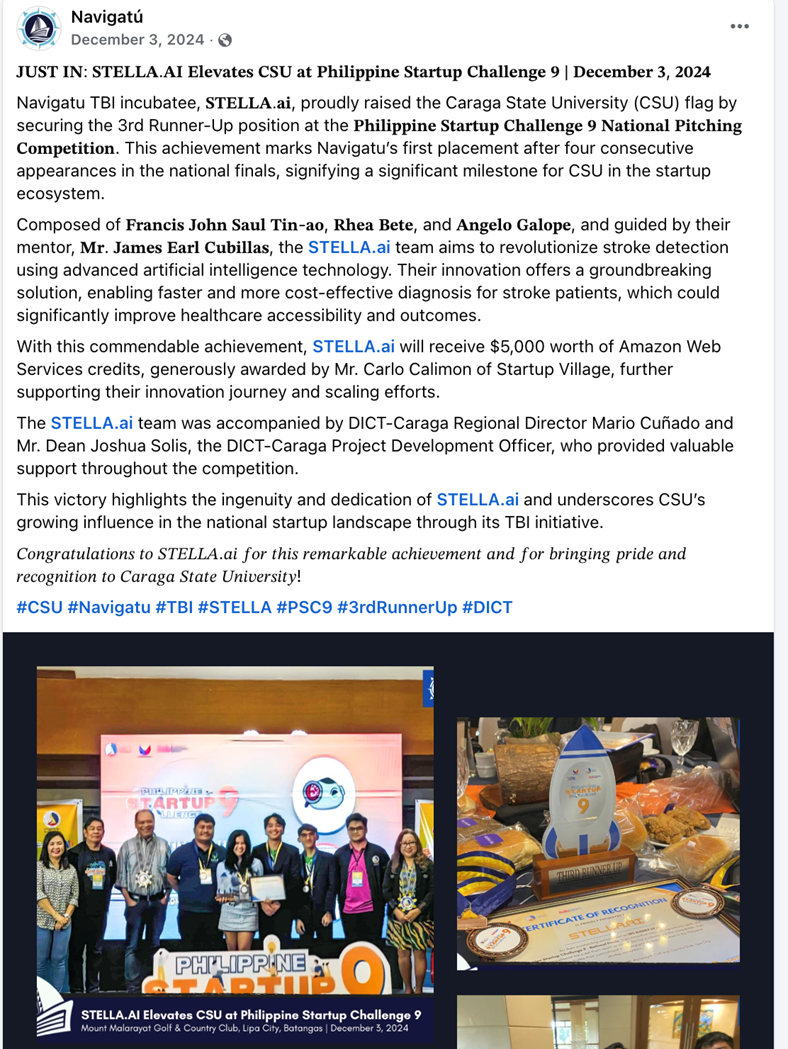
Photos states: “Navigatu TBI incubatee, 𝐒𝐓𝐄𝐋𝐋𝐀.𝐚𝐢, proudly raised the Caraga State University (CSU) flag by securing the 3rd Runner-Up position at the 𝐏𝐡𝐢𝐥𝐢𝐩𝐩𝐢𝐧𝐞 𝐒𝐭𝐚𝐫𝐭𝐮𝐩 𝐂𝐡𝐚𝐥𝐥𝐞𝐧𝐠𝐞 𝟗 𝐍𝐚𝐭𝐢𝐨𝐧𝐚𝐥 𝐏𝐢𝐭𝐜𝐡𝐢𝐧𝐠 𝐂𝐨𝐦𝐩𝐞𝐭𝐢𝐭𝐢𝐨𝐧. This achievement marks Navigatu’s first placement after four consecutive appearances in the national finals, signifying a significant milestone for CSU in the startup ecosystem. Composed of CSU students namely 𝐅𝐫𝐚𝐧𝐜𝐢𝐬 𝐉𝐨𝐡𝐧 𝐒𝐚𝐮𝐥 𝐓𝐢𝐧-𝐚𝐨, 𝐑𝐡𝐞𝐚 𝐁𝐞𝐭𝐞, and 𝐀𝐧𝐠𝐞𝐥𝐨 𝐆𝐚𝐥𝐨𝐩𝐞, and guided by their mentor, 𝐌𝐫. 𝐉𝐚𝐦𝐞𝐬 𝐄𝐚𝐫𝐥 𝐂𝐮𝐛𝐢𝐥𝐥𝐚𝐬, the STELLA.ai team aims to revolutionize stroke detection using advanced artificial intelligence technology. Their innovation offers a groundbreaking solution, enabling faster and more cost-effective diagnosis for stroke patients, which could significantly improve healthcare accessibility and outcomes. STELLA.ai receives USD 5,000 worth of assistance, generously awarded by Mr. Carlo Calimon of Startup Village, further supporting their innovation journey and scaling efforts.”
- Caraga State University Technology Business Incubator (TBI) Director served as Technical Panel for the DOST Caraga 𝟮𝟬𝟮𝟯 𝗖𝗮𝗿𝗮𝗴𝗮 𝗪𝗼𝗺𝗲𝗻-𝗛𝗲𝗹𝗽𝗶𝗻𝗴-𝗪𝗼𝗺𝗲𝗻: 𝗜𝗻𝗻𝗼𝘃𝗮𝘁𝗶𝗻𝗴 𝗦𝗼𝗰𝗶𝗮𝗹 𝗘𝗻𝘁𝗲𝗿𝗽𝗿𝗶𝘀𝗲 𝗣𝗿𝗼𝗴𝗿𝗮𝗺 (𝗪𝗛𝗪𝗶𝘀𝗲)
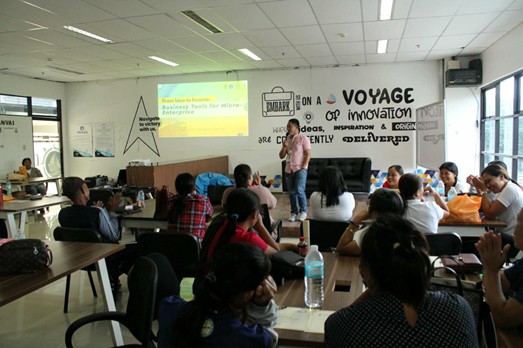
- Tara is another TBI initiative by CSU, designed to support local startups through training workshops, mentorship programs, and access to university facilities for agricultural and fisheries targeting those low-income families in the agriculture and fisheries communities in Caraga Region. It emphasizes the development of sustainable business models that address community needs and promote economic growth.Document Link: https://www.facebook.com/TARA.AgriAqua/
c. Provision of funding. Caraga State University (CSU) actively supports local startups by providing funding assistance and fostering an entrepreneurial ecosystem.
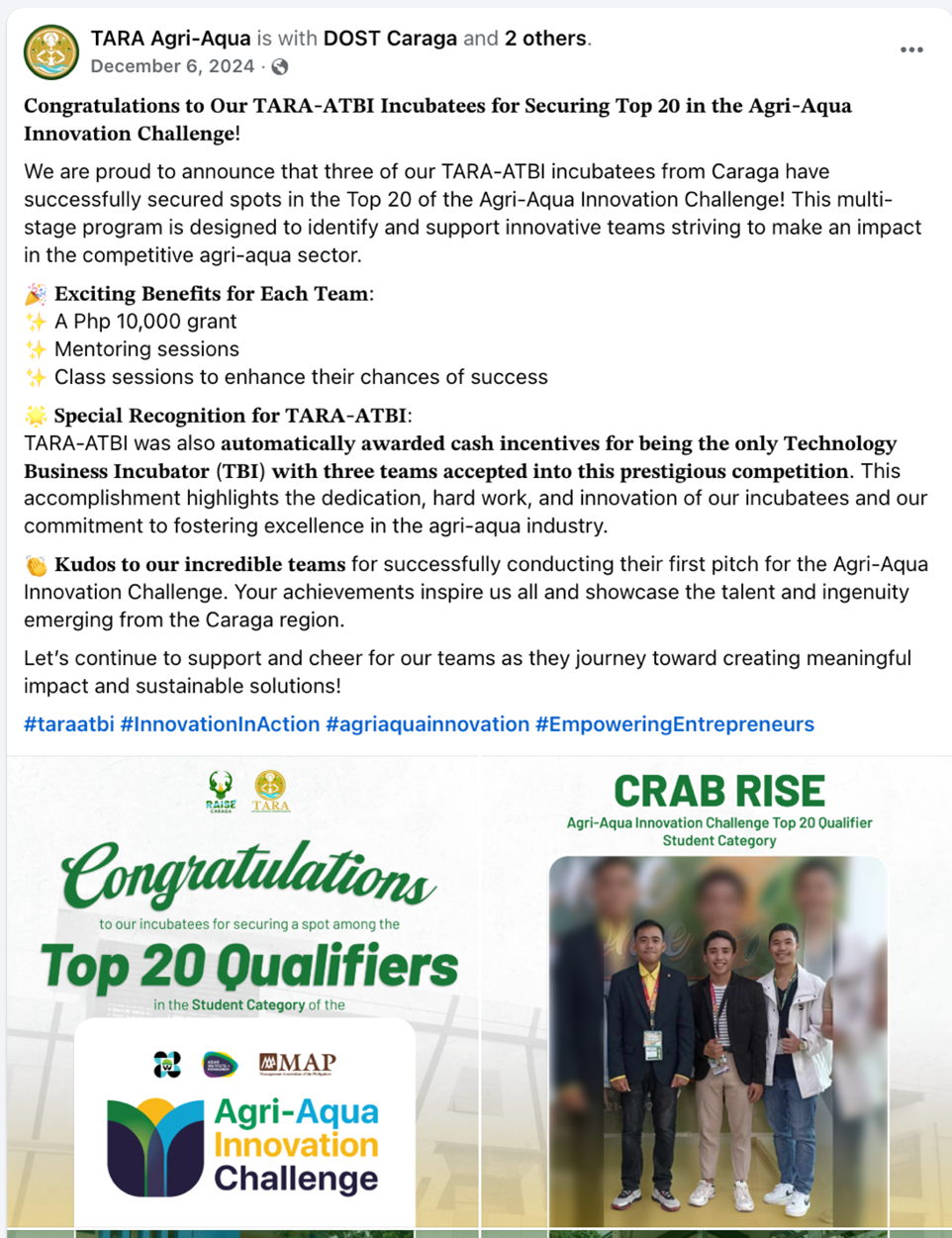
The image states that: We are proud to announce that three of our (Caraga State University’s) TARA-ATBI student incubatees from Caraga have successfully secured spots in the Top 20 of the Agri-Aqua Innovation Challenge! This multi-stage program is designed to identify and support innovative teams striving to make an impact in the competitive agri-aqua sector.
🎉 𝐄𝐱𝐜𝐢𝐭𝐢𝐧𝐠 𝐁𝐞𝐧𝐞𝐟𝐢𝐭𝐬 𝐟𝐨𝐫 𝐄𝐚𝐜𝐡 𝐓𝐞𝐚𝐦:
✨ A Php 10,000 grant
✨ Mentoring sessions
✨ Class sessions to enhance their chances of success
🌟 𝐒𝐩𝐞𝐜𝐢𝐚𝐥 𝐑𝐞𝐜𝐨𝐠𝐧𝐢𝐭𝐢𝐨𝐧 𝐟𝐨𝐫 𝐓𝐀𝐑𝐀-𝐀𝐓𝐁𝐈:
TARA-ATBI was also 𝐚𝐮𝐭𝐨𝐦𝐚𝐭𝐢𝐜𝐚𝐥𝐥𝐲 𝐚𝐰𝐚𝐫𝐝𝐞𝐝 𝐜𝐚𝐬𝐡 𝐢𝐧𝐜𝐞𝐧𝐭𝐢𝐯𝐞𝐬 𝐟𝐨𝐫 𝐛𝐞𝐢𝐧𝐠 𝐭𝐡𝐞 𝐨𝐧𝐥𝐲 𝐓𝐞𝐜𝐡𝐧𝐨𝐥𝐨𝐠𝐲 𝐁𝐮𝐬𝐢𝐧𝐞𝐬𝐬 𝐈𝐧𝐜𝐮𝐛𝐚𝐭𝐨𝐫 (𝐓𝐁𝐈) 𝐰𝐢𝐭𝐡 𝐭𝐡𝐫𝐞𝐞 𝐭𝐞𝐚𝐦𝐬 𝐚𝐜𝐜𝐞𝐩𝐭𝐞𝐝 𝐢𝐧𝐭𝐨 𝐭𝐡𝐢𝐬 𝐩𝐫𝐞𝐬𝐭𝐢𝐠𝐢𝐨𝐮𝐬 𝐜𝐨𝐦𝐩𝐞𝐭𝐢𝐭𝐢𝐨𝐧. This accomplishment highlights the dedication, hard work, and innovation of our incubatees and our commitment to fostering excellence in the agri-aqua industry.”
These initiatives reflect CSU’s commitment to empowering local communities through education, training, and direct support, thereby promoting sustainable economic development and poverty alleviation.
Local start-up financial assistance
Provide financial assistance to the local community supporting the start-up of financially and socially sustainable businesses.
Caraga State University (CSU) actively supports the development of financially and socially sustainable businesses within the local community through several key initiatives:
- Technology Business Incubators (TBIs):
- Navigatu: Established in 2018, Navigatu is a technology business incubator funded by the Department of Science and Technology (DOST) and hosted by CSU. It provides startups with essential resources, mentorship, and networking opportunities, focusing on sectors such as engineering, information technology, minerals, and ecotourism.
- Tara: Another TBI initiative by CSU, Tara offers financial support, training workshops, and access to university facilities for local startups focusing on agriculture, forestry, and fisheries. It emphasizes the development of sustainable business models that address agro-forestry and fisheries community needs and promote economic growth.Caraga State University (CSU) actively supports local startups by providing funding assistance and fostering an entrepreneurial ecosystem.
- Collaboration with DOST-TAPI TECHNiCOM Program: CSU coordinates with the DOST’s Technology Application and Promotion Institute (TAPI) through the Technology Innovation for Commercialization (TECHNiCOM) Program. This program aims to fast-track the transfer, utilization, and commercialization of research and development outputs. By collaborating with TECHNiCOM, CSU facilitates access to funding and support for local startups, enhancing their capacity to bring innovative products and services to market.
- Startup Grant Fund (SGF) Program: CSU participates in the Startup Grant Fund (SGF) Program, which provides financial assistance to startups. This program aims to support the commercialization of innovative products and services, fostering entrepreneurship within the region.
- Collaboration with Government Agencies: CSU collaborates with various government agencies to facilitate access to funding programs for startups. For instance, the university works with the Department of Trade and Industry (DTI) and the Department of Science and Technology (DOST) to provide financial assistance and resources to local entrepreneurs.
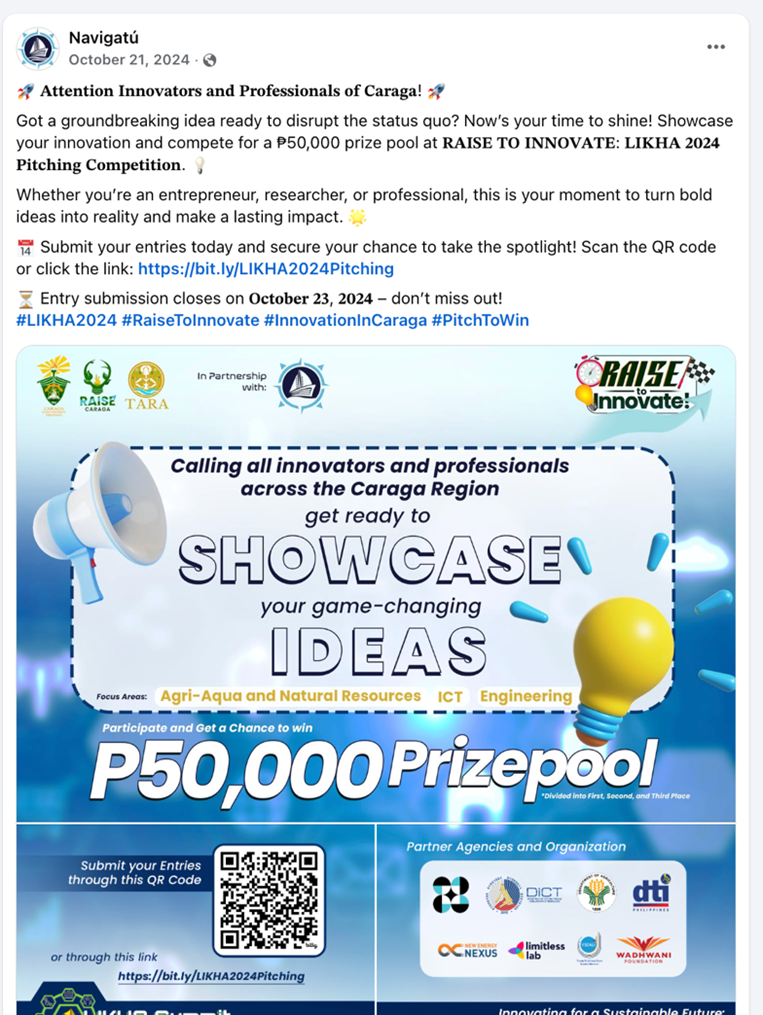 The image states: 🚀 𝐀𝐭𝐭𝐞𝐧𝐭𝐢𝐨𝐧 𝐈𝐧𝐧𝐨𝐯𝐚𝐭𝐨𝐫𝐬 𝐚𝐧𝐝 𝐏𝐫𝐨𝐟𝐞𝐬𝐬𝐢𝐨𝐧𝐚𝐥𝐬 𝐨𝐟 𝐂𝐚𝐫𝐚𝐠𝐚! 🚀
The image states: 🚀 𝐀𝐭𝐭𝐞𝐧𝐭𝐢𝐨𝐧 𝐈𝐧𝐧𝐨𝐯𝐚𝐭𝐨𝐫𝐬 𝐚𝐧𝐝 𝐏𝐫𝐨𝐟𝐞𝐬𝐬𝐢𝐨𝐧𝐚𝐥𝐬 𝐨𝐟 𝐂𝐚𝐫𝐚𝐠𝐚! 🚀Got a groundbreaking idea ready to disrupt the status quo? Now’s your time to shine! Showcase your innovation and compete for a Php 50,000 prize pool at 𝐑𝐀𝐈𝐒𝐄 𝐓𝐎 𝐈𝐍𝐍𝐎𝐕𝐀𝐓𝐄: 𝐋𝐈𝐊𝐇𝐀 𝟐𝟎𝟐𝟒 𝐏𝐢𝐭𝐜𝐡𝐢𝐧𝐠 𝐂𝐨𝐦𝐩𝐞𝐭𝐢𝐭𝐢𝐨𝐧. 💡
Whether you’re an entrepreneur, researcher, or professional, this is your moment to turn bold ideas into reality and make a lasting impact. 🌟
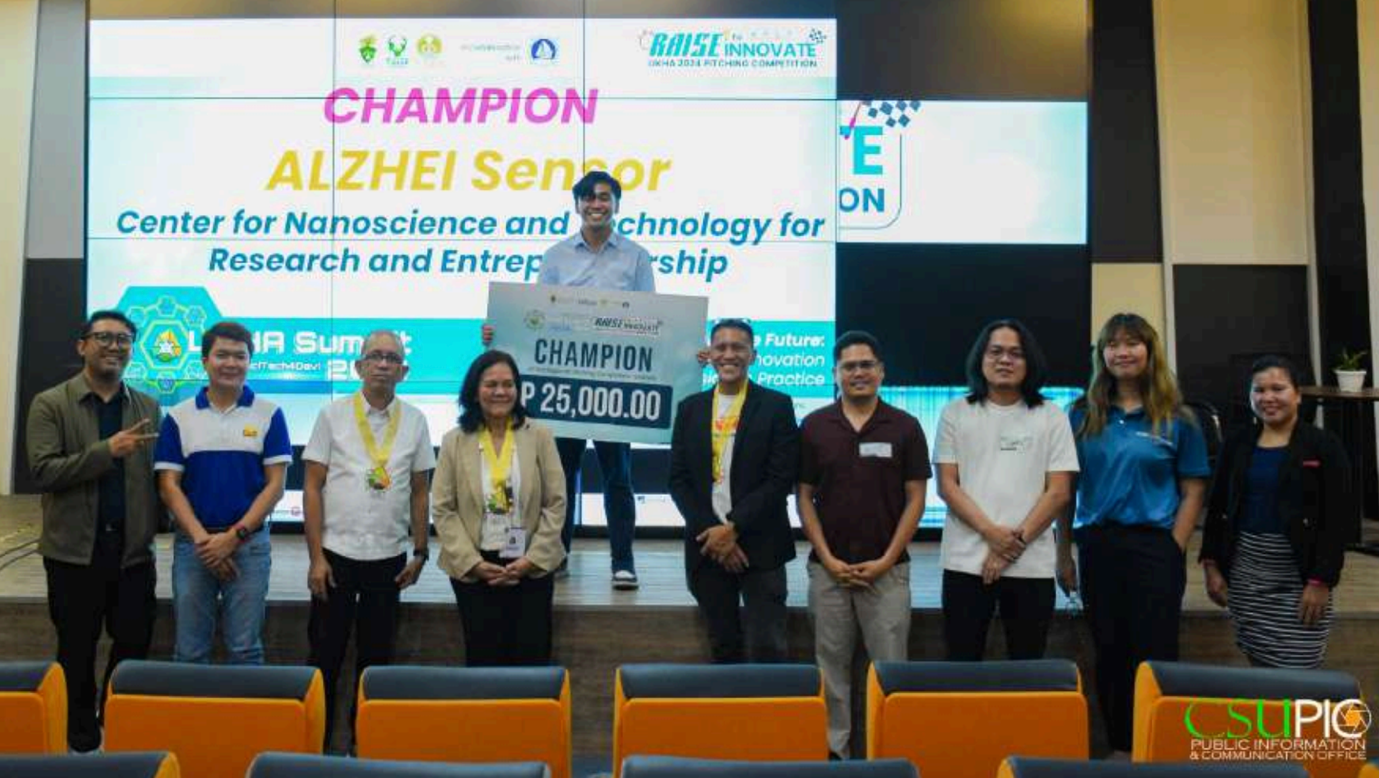 ALZEI Sensor by Rey Marc T. Cumba as the Winning Pitch during the LIKHA Summit Pitching Competition
ALZEI Sensor by Rey Marc T. Cumba as the Winning Pitch during the LIKHA Summit Pitching Competition
Programmes for services access
Caraga State University (CSU) actively advances SDG 1 by expanding equitable access to essential community services—particularly among vulnerable, rural, and Indigenous populations. Through its research-driven extension initiatives, CSU strengthens pathways for individuals and communities to access mental health support, educational opportunities, social protection services, and nutrition interventions. These programs are grounded in evidence-based community needs assessments and implemented in partnership with national agencies, LGUs, schools, and civil society groups. By reducing structural barriers to health, education, livelihood services, and community development programs, CSU ensures that the most marginalized sectors—rural families, low-income learners, Indigenous communities, and underserved barangays—benefit from responsive, inclusive, and sustainable support systems. Collectively, these efforts demonstrate the university’s commitment to enabling long-term socio-economic resilience through enhanced service accessibility across the Caraga Region.
Link to the OVPRDIE 2024 Annual Accomplishment Report: 2024 RDIE Annual Report
1. Community-Based Psychosocial Support Program (Mental Health Services Access)
This project explicitly addresses access to mental health services, especially in rural and underserved communities, by reducing barriers, increasing awareness, and providing community-level psychosocial support.
CSU’s Community-Based Psychosocial Support Program plays a vital role in expanding access to mental health and well-being services among rural and underserved communities in Caraga. Designed as a direct response to increasing psychosocial vulnerabilities—especially among families recovering from crisis, displacement, or socio-economic hardship—the program delivers structured mental health first-aid, stress management training, emotional support frameworks, and referral pathways at the community level. Through capacity-building sessions, CSU faculty specialists train barangay leaders, teachers, and local volunteers to recognize signs of mental distress, provide initial psychological support, and guide individuals toward appropriate care. This approach ensures that mental health services, which are often inaccessible in geographically isolated or disadvantaged areas, become embedded within the community itself. The program particularly benefits women, youth, and households affected by trauma or chronic stress by empowering them with coping tools, socio-emotional learning, and safe spaces for dialogue. By normalizing conversations around mental health and strengthening community support systems, CSU significantly reduces barriers to psychological care and contributes to the broader goal of inclusive, equitable access to essential health services.
Read: OVPRDIE 2024 Annual Accomplishment Report – Pages 24–26. 2024 RDIE Annual Report
2. HITSAS–TULAY: Educational and Social Protection Access for Indigenous Youth
This program aims to improve educational access and community support mechanisms for Lumad youth, addressing systemic barriers and promoting equitable development.
Read: OVPRDIE 2024 Annual Accomplishment Report – Page 45. 2024 RDIE Annual Report
3. Outreach Projects for Indigenous Communities (Educational & Social Services Access)
Outreach program for Indigenous People (IP) students includes information dissemination on scholarships, educational opportunities, and community support—expanding access to education and social services.
Read: OVPRDIE 2024 Annual Accomplishment Report – Pages 45–46.
4. Seedling Distribution Supporting Nutrition & Food Security (Indirect Health Services Access)
This activity supports DepEd’s “Gulayan sa Paaralan” program, which links to school nutrition and feeding programs, enhancing access to nutritional support for schoolchildren. Read: OVPRDIE 2024 Annual Accomplishment Report – Pages 95–96. 2024 RDIE Annual Report
5. CLEAN Pagatpatan: Environmental Awareness & Community Service Engagement
While environmental in nature, this project includes community learning sessions that provide access to environmental education and services supporting community preparedness. Read: Extension Services Narrative Report – Page 112–113. 2024 RDIE Annual Report
6. Partnership with DSWD–SLP (Access to Social Welfare & Livelihood Services)
CSU’s recognition and involvement with the Sustainable Livelihood Program reflect improved access for communities to national social protection and livelihood services.
Read: Extension Services Narrative Report – Page 78–84. 2024 RDIE Annual Report
Organise training or programmes to improve access to basic services for all.
Caraga State University (CSU) is dedicated to enhancing community access to essential services through various training programs and initiatives. These efforts aim to empower local communities by providing education and resources in key areas.

The Caraga State University was recognized by the Department of Social Welfare and Development (DSWD) as the Best Program Partner-NGA/NGO for commendable support and exemplar contribution to Sustainable Livelihood Program for CY 2024 and received trophy of Kabalikat Award under Public Partner Category as Most Outstanding Partner. This given on 13th day of December 2024 at Doties Place, Butuan City. The event was attended by our Extension Director Dr. Romell A. Seronay together with TTLO/ITSO Chief Charisse D. Galusan.
In 2024, Caraga State University (CSU) focused on several key initiatives to improve access to basic services for local communities through training programs and capacity-building efforts:
a. Training on Livelihood and Community Health:
The 2024 RDIE Annual and Extension reports collectively document more than 40 free livelihood- and community health–oriented training programs, reflecting CSU’s extensive efforts to uplift marginalized communities across Caraga. These include multi-week skills development initiatives such as baking, welding, silk screen printing, and light vehicle maintenance—programs designed to provide employable competencies and open income-earning opportunities for unemployed and underemployed individuals. Alongside these are comprehensive agriculture and farmer productivity trainings, including abaca disease management, irrigated lowland rice production, coffee farming and pest management, ruminant health practices, and vegetable seedling production, all of which strengthen food security and enhance rural livelihoods. Support for micro-entrepreneurs is also prominent through MSME technology transfer programs focused on food processing, Good Manufacturing Practices (GMP), fruit preserve production, chip product enhancement, and product development workshops. Complementing these economic initiatives are essential financial literacy and property rights seminars that help families manage income, protect assets, and improve long-term financial stability. Additionally, CSU implements community health–focused programs, such as medicinal plant education, traditional healthcare practices, and massage therapy workshops, reinforcing household well-being and alternative livelihood options. Environmental education and psychosocial support sessions further strengthen community resilience, particularly in vulnerable sectors. Collectively, these initiatives demonstrate CSU’s holistic approach to poverty reduction by advancing income generation, health, empowerment, and community sustainability across the region.
1. Livelihood Skills Training Programs
These are repeatedly implemented multi-week activities that provide practical, employable skills to unemployed, out-of-school, and low-income residents.
- Baking Livelihood Skills Extension Project. Found across multiple weeks: Week 1 to Week 7
- Silk Screen Printing Skills Training. Recurring: Week 1 to Week 7
- Welding and Fabrication Technology Training. Recurring: Week 1 to Week 7
- Light Vehicle Driving with Engine Tune-Up and Preventive Maintenance. Week 1 to Week 7
- Skills Training on Catering and Kitchen Operation (Mainit, SDN)
2. Agricultural & Farmer Livelihood Support Trainings (linked to livelihood and health). These improve food security, income, and rural livelihoods.
- Addressing Virus Diseases in Abaca Production – Training Series Multiple batches
- Training on Irrigated Lowland Rice Production and Management
- Coffee Farming Technologies & Sustainability Training
- Coffee Pest Management Training (SciTech II)
- CAA-LIFE: Ruminant Feeding and Basic Health Management
- Agrimmunity: Vegetable Seedling Production and Nursery Establishment
3. Technology-Based Livelihood Support for MSMEs
- Product Development and Enhancement for MSMEs
- Mastering the Basics: Fruit Preserve Production Technology
- Food Safety & Good Manufacturing Practices (GMP)
- Enhancing Chip Products through Frying Technique Refinement
4. Financial Literacy & Economic Empowerment (health of household finances)
- Training on Financial Literacy
- Financial Literacy Training (additional session)
- Unlocking Property Rights: Land Titling Seminars
- Helps secure land assets of poor households
5. Community Health–Focused Training Programs
These are health-oriented but closely tied to community well-being and poverty reduction.
- Medicinal Plants and Traditional Healthcare Practices (Pagatpatan Community) Multiple sessions: massage therapy, herbal medicine, community health
- General Massage Demonstration & Workshops Health and wellness livelihood
- Community Learning for Environmental Awareness and Nurturing (CLEAN) Includes health-oriented community engagement
6. Mental Health / Psychosocial Support (Community Health)
CSU’s Community-Based Psychosocial Support Programs play a crucial role in strengthening community health by expanding access to mental health care and emotional support services, particularly in rural and underserved areas. Through these initiatives, the university equips community members, local leaders, and educators with essential skills in psychological first aid, stress management, and trauma-informed care, enabling them to identify signs of mental distress and provide immediate, culturally sensitive support. The program fosters safe spaces for dialogue, healing, and coping—especially for vulnerable groups such as women, youth, and families affected by crisis or socio-economic hardship. By embedding psychosocial support systems within communities and reducing barriers to mental health services, the program significantly enhances overall well-being and resilience, contributing to stronger, healthier, and more empowered communities.
b. Gender and Development Initiatives:
1. Gender Sensitivity Training for Teachers, Students, and Stakeholders
This training was conducted at Taligaman National High School on March 18, 2024, led by the CSU College of Humanities and Social Sciences, particularly the Social Work Department. It aimed to deepen awareness of gender equality, prevent bullying and harassment, and foster a more inclusive environment. Expected outcomes included:
- Promoting gender equality
- Preventing bullying and harassment
- Improving communication skills
- Preparing learners for diversity in the workplace
2. Gender Sensitivity Training for Barangay Officials and Lupong Tagapamayapa (Community-Level Training)
Another GAD training was conducted on July 1 and 29, 2024 at Barangay Baan Km. 3, Butuan City. This activity worked with barangay leaders to strengthen gender awareness in community governance and conflict resolution.
3. Establishment of a Gender and Development (GAD) Core/Watch Group
The OVPRDIE report recommends forming a GAD Core/Watch Group to strengthen community engagement and address gender-related concerns more systematically.
CSU’s GAD initiatives include:
- School- and community-based Gender Sensitivity Trainings
- Activities aligned with National Women’s Month
- Promotion of inclusive curricula and GAD corners in partner schools
- Strengthening community-level gender equality through barangay trainings
- Establishment of a GAD watch group for sustained engagement
These efforts collectively demonstrate CSU’s commitment to gender inclusivity, community empowerment, and alignment with national GAD mandates.
Source Link: https://sustainability.carsu.edu.ph/?page_id=1823
CSU’s TTLO serves MSMEs
- TTLO provides patent search, patent drafting, and IP education to external stakeholders, including MSMEs.
The report states that TTLO “provides technical assistance in the conduct of patent search and patent drafting activities and training to faculty members in the university and different stakeholders in the region,” which includes MSMEs supported under the university’s innovation ecosystem. - TTLO’s vision and mission explicitly include serving communities and supporting innovation for regional benefit.
Its vision references “serving the Caraga State University and the communities in the region, enabling and supporting increased innovation… for the benefit of the University and the communities in the region,” which includes MSMEs adopting CSU technologies. - TTLO participates in regional innovation capacity-building events that involve MSMEs.
The office took part in the Industrial Design and Patent Cooperation Treaty training for Regional Innovation, which is part of CSU’s wider support for regional innovators, including small enterprises. - TTLO is linked to DOST’s RAISE Program, which is designed to strengthen regional innovation systems—including startup and MSME engagement—by improving intellectual property and technology business management capacity in Caraga.
The 2024 OVPRDIE report confirms that CSU’s TTLO serves MSMEs by:
- Providing technical IP assistance (patent drafting, IP searches)
- Delivering IP education and training for regional stakeholders including enterprises
- Participating in regional innovation programs that involve MSME capacity building
- Supporting technology protection and commercialization pathways that MSMEs can adopt
Source Link: 2024 RDIE Annual Report
Policy addressing poverty
Participate in policy making at local, regional, national, and/or global level to implement programmes and policies to end poverty in all its dimensions.
Caraga State University (CSU) actively engages in policy-making processes at various levels to address and alleviate poverty in all its dimensions.
The university’s involvement includes:
- Research and Development Initiatives: CSU conducts research focused on socio-economic development, particularly in the Caraga Region. These research activities inform policy decisions and contribute to the formulation of strategies aimed at poverty reduction. The university’s Research and Development Office collaborates with government agencies and non-governmental organizations to ensure that research outputs are translated into actionable policies.
- Participation in Regional Development Councils: CSU representatives actively participate in regional development councils and committees specifically at the development of the National Economic Development (NEDA) Caraga Region Development Plan (RDP) 2023-2028, contributing expertise and insights to the creation and implementation of the development plans. This involvement ensures that educational perspectives are integrated into regional policies addressing poverty and related socio-economic issues.
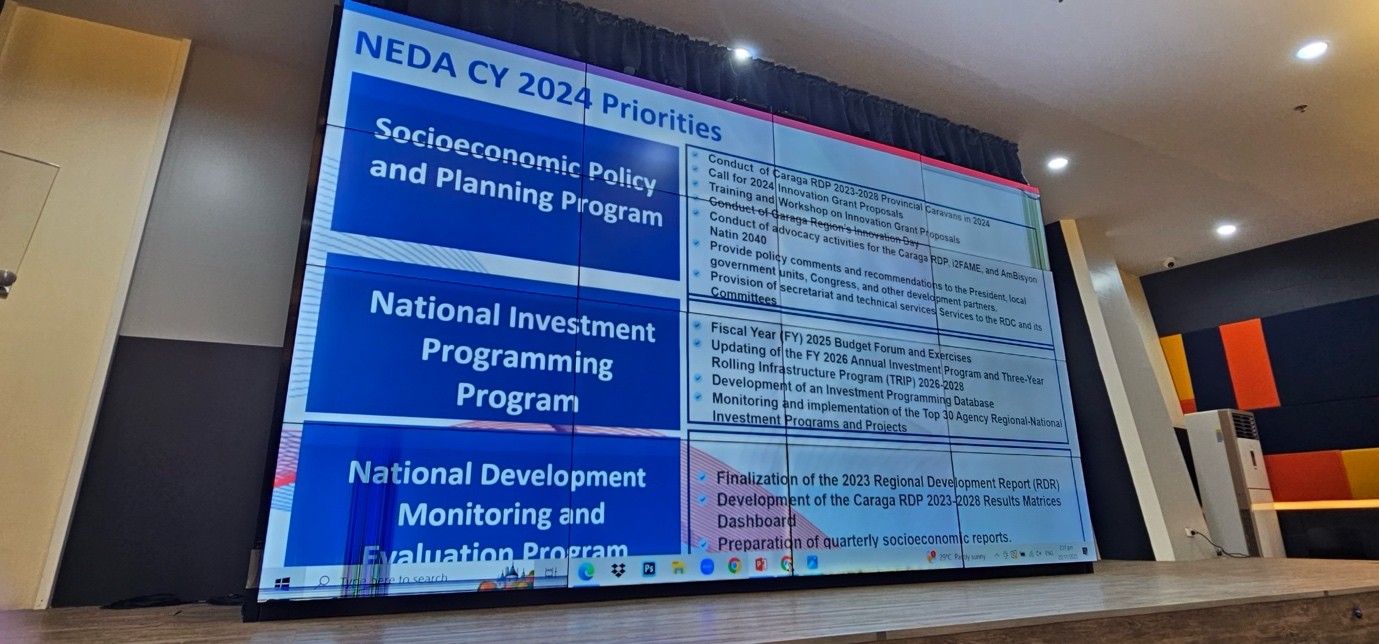 The NEDA Caraga Region Development Plan (RDP) 2023-2028 aligns with SDG 1: No Poverty through a multi-dimensional approach that tackles the root causes of poverty and fosters sustainable economic empowerment. This plan emphasizes job creation, skill development, and support for MSMEs to stimulate local economies and promote inclusive growth. Investments in agricultural modernization, infrastructure enhancement, and renewable energy aim to improve productivity, food security, and access to markets and essential services. Additionally, comprehensive social protection programs, expanded access to basic services, and disaster resilience initiatives are integrated to safeguard the most vulnerable communities, providing them with the support needed to withstand economic and environmental shocks.
The NEDA Caraga Region Development Plan (RDP) 2023-2028 aligns with SDG 1: No Poverty through a multi-dimensional approach that tackles the root causes of poverty and fosters sustainable economic empowerment. This plan emphasizes job creation, skill development, and support for MSMEs to stimulate local economies and promote inclusive growth. Investments in agricultural modernization, infrastructure enhancement, and renewable energy aim to improve productivity, food security, and access to markets and essential services. Additionally, comprehensive social protection programs, expanded access to basic services, and disaster resilience initiatives are integrated to safeguard the most vulnerable communities, providing them with the support needed to withstand economic and environmental shocks.Key strategies include inclusive policy development that ensures equal opportunities, transparent governance, and participatory planning that engages communities in decision-making processes. The plan promotes grassroots involvement and public-private partnerships to implement poverty reduction initiatives effectively. Expected outcomes are a significant reduction in poverty incidence, increased community resilience, and equitable access to resources. A monitoring and evaluation framework is included to track progress, allowing for data-driven refinements and maximizing the impact of these poverty alleviation efforts, ensuring that no one is left behind in Caraga’s pursuit of sustainable development.
Document Link: Caraga dev’t council to launch prov’l caravan in Agusan Norte, Butuan City.
Document Link: https://www.carsu.edu.ph/about-us/
- Extension Programs and Community Engagement: Through its extension programs, CSU implements community-based projects that address poverty-related challenges. These programs often serve as pilot initiatives that, upon demonstrating success, can be scaled up and adopted into local and regional policies. By working directly with communities, CSU provides valuable data and feedback that inform policy adjustments and the development of new strategies.
Document Link: https://www.carsu.edu.ph/?q=page%2Ffunctions-and-objectives
Regional Policy Formulations:
According to a document from 2024, the Regional Policy Formulation content in the 2024 OVPRDIE Annual Accomplishment Report appears in several sections that show CSU’s direct involvement in regional planning, policy alignment, and capacity-building for government bodies. These sections demonstrate how CSU contributes evidence, expertise, and technical support to policymaking processes in Caraga.
1. RDIE Agenda Setting for 2025–2030
Located on page 62, this section discusses CSU’s leadership in harmonizing its research agenda with national and regional policy frameworks such as the Philippine Development Plan, Caraga Regional Development Plan, SDGs, and DOST’s Harmonized R&D Agenda.
This activity supports regional policy alignment and development planning.
2. Participation in the Caraga Regional Development Plan (RDP) 2023–2028 Provincial Caravan
Located on page 76, this section documents Caraga State University’s participation in the NEDA-led RDP Provincial Caravan, which involves dissemination and discussion of regional policy priorities with LGUs, agencies, private sector, and academia.
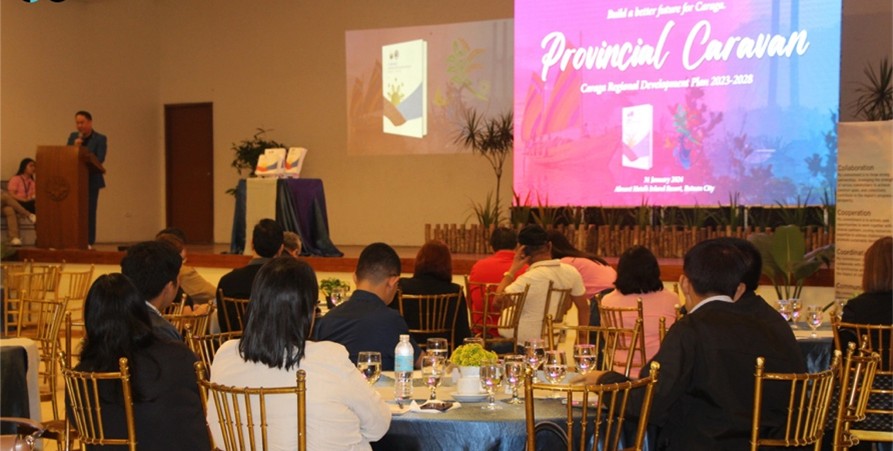
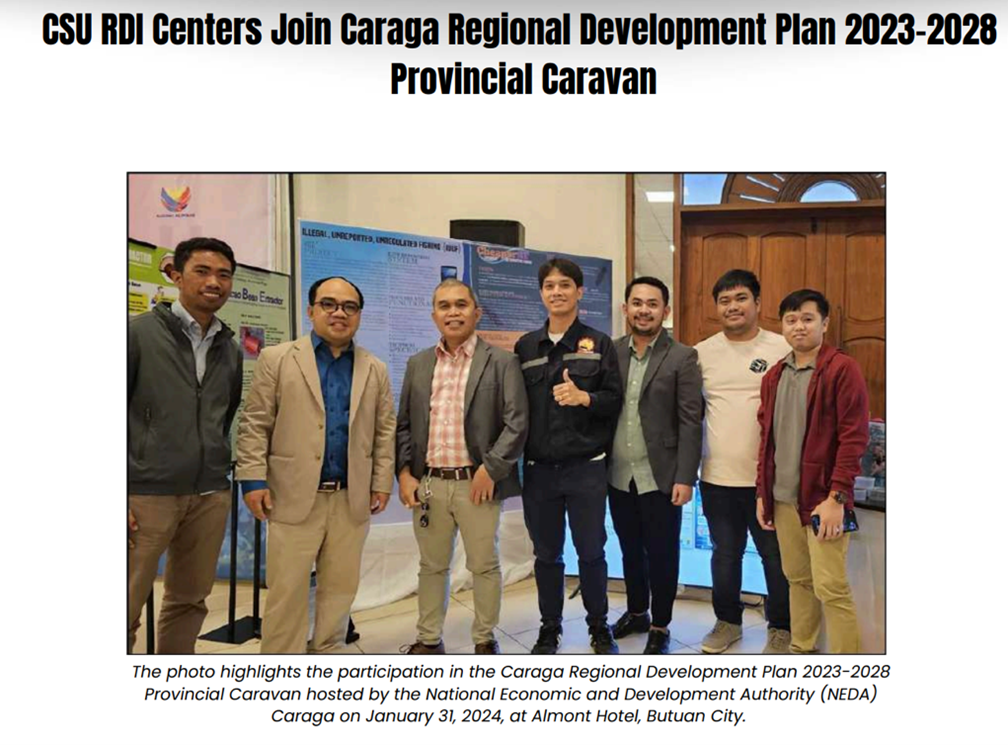
2. Regional Research, Development, and Innovation Committee (RRDIC) Quarterly Meetings. The 2nd quarter meeting of the Regional Research, Development, and Innovation Committee (RRDIC) for CY 2024, presided over by the Chairperson of RDC-RRDIC, Engr. Noel M. Ajoc, was successfully on June 11, 2024, at the Caraga State University Conference Hall, with Dr. Jaymer Jayoma of CSU attending the meeting. This gathering brought together key stakeholders to discuss the future of research, development, and innovation in the region. The meeting concluded with a renewed commitment from its members to continue working collaboratively towards the region’s development goals.

RRDIC is a committee, typically under the Regional Development Council (RDC) and often chaired by the Department of Science and Technology (DOST), that works to harmonize and advance a region’s research, development, and innovation policy agenda. Its key functions include formulating a regional R&D policy agenda, identifying collaborative opportunities, monitoring projects, and promoting the adoption of new technologies for socioeconomic growth.
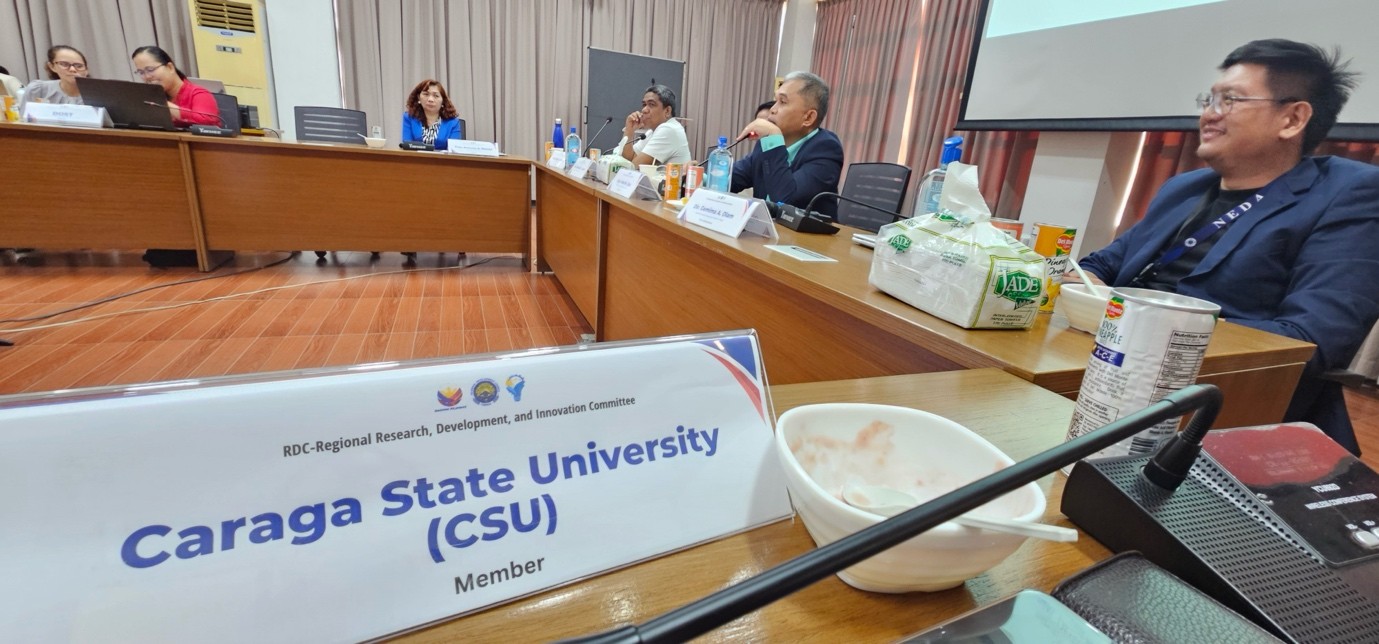
3. GIS Training for the Caraga RPFP Technical Working Group (TWG)
In the Extension Services Narrative Report, this program is specifically titled:
“Training-Workshop on Geographic Information System (GIS) for the Caraga RPFP Technical Working Group (TWG)”.
The RPFP (Regional Physical Framework Plan) is one of the most important regional policy documents of NEDA, and CSU’s training directly supports the technical capacity of the TWG in developing and reviewing it.

4. Policy Brief Writeshop under the Falcata Adoption Research Project
Located on page 29 of the OVPRDIE 2024 Annual Report, this section describes a Policy Brief Writeshop and policy recommendation activities related to the research on communication pathways for falcata farmers. This contributes to sectoral policy formulation in agriculture and rural development.
5 Regional S&T Development
The 2024 Regional Science, Technology, and Innovation Week in Caraga commenced with the theme, “Innovate for Impact: Transforming Caraga’s Fishery, Agroforestry, Mining, and Ecotourism Economy through Science, Technology, and Innovation”, held on June 6-9, 2024 at the Robinsons Butuan in Butuan City.
One of the key highlights of the day was the Smart Communities Forum. Participants, including urban planners, tech developers, and community leaders, discussed cutting-edge ideas for building sustainable, tech-driven communities. Topics ranged from smart city infrastructure to the integration of IoT (Internet of Things) in public services, aiming to improve the quality of life for residents in Caraga. In the afternoon, the Commercial Technologies Forum showcased a variety of innovative technologies ready to transform various industries. Entrepreneurs and business leaders presented groundbreaking solutions in sectors such as agriculture, manufacturing, and healthcare. The forum provided a platform for networking and potential collaborations, fostering a spirit of entrepreneurship and innovation.

Regional SDG Catch-Up Plan
Caraga State University (CSU) has actively contributed to the development of the Caraga Sustainable Development Goals (SDG) Catch-Up Plan, a strategic initiative aimed at accelerating the region’s progress toward achieving the United Nations’ SDGs. This plan addresses areas where the region has lagged and outlines targeted interventions to meet the 2030 Agenda for Sustainable Development.
CSU’s Involvement in the Caraga SDG Catch-Up Plan:
- Research and Data Analysis:
- CSU’s research departments have conducted studies to assess the region’s current status concerning various SDGs. These analyses have provided critical data to identify gaps and prioritize areas needing immediate attention.
- Capacity Building and Education:
- The university has organized workshops and training sessions for local government units (LGUs) and community organizations. These programs aim to enhance understanding of the SDGs and equip stakeholders with the skills necessary for effective implementation of the catch-up strategies.
- Community Engagement:
- Through its extension programs, CSU has facilitated community consultations to ensure that the catch-up plan reflects the needs and aspirations of local populations. This participatory approach has been crucial in designing interventions that are both effective and sustainable.
 Figure shown above refers to the Caraga Catch-Up Plan for the SDGs. Link: https://nro13.neda.gov.ph/sdg-catch-up-plan
Figure shown above refers to the Caraga Catch-Up Plan for the SDGs. Link: https://nro13.neda.gov.ph/sdg-catch-up-plan
- Through its extension programs, CSU has facilitated community consultations to ensure that the catch-up plan reflects the needs and aspirations of local populations. This participatory approach has been crucial in designing interventions that are both effective and sustainable.
- Technical Assistance:
- CSU has provided technical support in developing monitoring and evaluation frameworks to track the progress of the catch-up plan. This includes setting up indicators and benchmarks aligned with national and global SDG targets.
- Innovation and Technology:
- Leveraging its expertise in science and technology, CSU has introduced innovative solutions to address specific challenges identified in the catch-up plan. For instance, developing sustainable agricultural practices and renewable energy projects to promote environmental sustainability and economic growth.
CSU’s involvement underscores its commitment to regional development and its role as a catalyst for positive change in Caraga. By aligning its resources and expertise with the objectives of the SDG Catch-Up Plan, the university contributes significantly to the region’s efforts to achieve sustainable development and improve the quality of life for its residents.
Local Policy Formulations
Caraga State University (CSU) is committed to fostering community engagement and impactful participatory development that aligns with addressing poverty on local levels. The university emphasizes the co-design of community-centered initiatives through active collaboration with local communities to identify and address their specific needs. These initiatives leverage CSU’s academic resources and research capabilities to promote sustainable development and social empowerment (CSU Strategic Plan document link: https://sustainability.carsu.edu.ph/?page_id=651).
CSU’s policy approach involves partnerships and innovative strategies that integrate education, research, and direct community support. By enhancing its outreach and engagement, CSU actively participates in local and regional policy-making processes, contributing to the formulation and implementation of programs designed to reduce poverty and improve quality of life. This includes developing educational and research hubs that fuel local innovation, promote entrepreneurship, and foster skills that drive economic resilience CSU Strategic Plan document link: https://sustainability.carsu.edu.ph/?page_id=651.
The CSU Strategic Plan embeds efforts relevant to this goal within its broader strategic priorities. These include community engagement and participatory development initiatives aimed at identifying community needs and co-developing projects that contribute to social empowerment and sustainable development strategic initiatives align with SDG 1 through:
- Participatory Development: Collaborating with local communities to design initiatives that tackle specific needs, fostering sustainable solutions to poverty.
- Sustainable and Responsible Education: Integrating sustainability principles into curricula to prepare students to address real-world challenges, including poverty reduction demonstrate CSU’s commitment to leveraging educational and community resources to make meaningful contributions to local poverty alleviation.
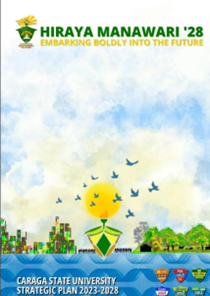 These activities highlight CSU’s commitment to contributing to policy-making processes aimed at eradicating poverty, leveraging its academic and research capabilities to influence and support effective policy development.
These activities highlight CSU’s commitment to contributing to policy-making processes aimed at eradicating poverty, leveraging its academic and research capabilities to influence and support effective policy development.
SUMMARY OF IMPACT
Caraga State University’s efforts under SDG 1 generated substantial and measurable outcomes that directly contribute to poverty reduction across the region. In 2024, the university supported more than 18,879 low-income students by providing robust financial aid and academic assistance, ensuring equitable access to higher education. Beyond campus, CSU empowered over 12,000 community beneficiaries through extensive livelihood and agricultural training programs that strengthened income-generation skills, enhanced productivity, and improved household resilience. The university also deployed multiple poverty-alleviating technologies—such as processing equipment, drying systems, and digital tools—to local industries and LGUs, helping increase efficiency and create economic opportunities in underserved communities. MSME development was further advanced through CSU’s Technology Transfer and Licensing Office (TTLO) and its incubators Navigatu and Tara, which provided critical support in product development, market readiness, and enterprise scaling. All these initiatives were made possible through CSU’s strong multi-sectoral partnerships with LGUs, national agencies, NGOs, and international collaborators, creating a coordinated ecosystem of support that amplifies the university’s impact on regional socio-economic development and long-term poverty alleviation.
CONCLUSION
Caraga State University’s strengthened SDG 1 initiatives collectively illustrate the institution’s deep and sustained commitment to uplifting the socio-economic conditions of communities across the Caraga Region. By integrating research-driven solutions with inclusive education systems, targeted livelihood training, technology transfer, and community-centered programs, CSU has created tangible and meaningful pathways out of poverty for thousands of individuals and families. The university’s strategic collaborations with local government units, national agencies, industry partners, and international organizations further amplify its reach and ensure that interventions are both responsive and sustainable. These efforts not only address immediate needs but also build long-term resilience and capacity among marginalized and vulnerable populations. As CSU continues to align its mission with national development priorities and global sustainability goals, it reaffirms its dedication to expanding, strengthening, and institutionalizing its poverty-alleviation programs. Moving toward 2030 and beyond, the university remains steadfast in its vision of becoming a leading driver of inclusive growth, community empowerment, and socio-economic transformation in the region and the country.
